mirror of
https://github.com/junegunn/fzf.git
synced 2025-08-01 20:52:06 -07:00
Compare commits
23 Commits
| Author | SHA1 | Date | |
|---|---|---|---|
|
|
e086f0b3fe | ||
|
|
8255aa23f4 | ||
|
|
a4bc08f5a3 | ||
|
|
7e5aa1e2a5 | ||
|
|
0818dbc36a | ||
|
|
347c4b2625 | ||
|
|
34f0d4d0c4 | ||
|
|
cbedb57511 | ||
|
|
9ef825d2fd | ||
|
|
85ae745910 | ||
|
|
7411da8d5a | ||
|
|
3f75a8369f | ||
|
|
4cd621e877 | ||
|
|
6e3a2fe0bf | ||
|
|
8b0e1f941a | ||
|
|
c7c5e7670a | ||
|
|
f6c621ef1b | ||
|
|
faf32d451d | ||
|
|
252fd7ecb1 | ||
|
|
7fa89dddb4 | ||
|
|
fefdb8c84e | ||
|
|
a6cc05936e | ||
|
|
b209843545 |
@@ -14,6 +14,25 @@ builds:
|
|||||||
- amd64
|
- amd64
|
||||||
ldflags:
|
ldflags:
|
||||||
- "-s -w -X main.version={{ .Version }} -X main.revision={{ .ShortCommit }}"
|
- "-s -w -X main.version={{ .Version }} -X main.revision={{ .ShortCommit }}"
|
||||||
|
hooks:
|
||||||
|
post: |
|
||||||
|
sh -c '
|
||||||
|
cat > /tmp/fzf-gon-amd64.hcl << EOF
|
||||||
|
source = ["./dist/fzf-macos_darwin_amd64/fzf"]
|
||||||
|
bundle_id = "kr.junegunn.fzf"
|
||||||
|
apple_id {
|
||||||
|
username = "junegunn.c@gmail.com"
|
||||||
|
password = "@env:AC_PASSWORD"
|
||||||
|
}
|
||||||
|
sign {
|
||||||
|
application_identity = "Developer ID Application: Junegunn Choi (Y254DRW44Z)"
|
||||||
|
}
|
||||||
|
zip {
|
||||||
|
output_path = "./dist/fzf-{{ .Version }}-darwin_amd64.zip"
|
||||||
|
}
|
||||||
|
EOF
|
||||||
|
gon /tmp/fzf-gon-amd64.hcl
|
||||||
|
'
|
||||||
|
|
||||||
- id: fzf-macos-arm
|
- id: fzf-macos-arm
|
||||||
binary: fzf
|
binary: fzf
|
||||||
@@ -23,6 +42,25 @@ builds:
|
|||||||
- arm64
|
- arm64
|
||||||
ldflags:
|
ldflags:
|
||||||
- "-s -w -X main.version={{ .Version }} -X main.revision={{ .ShortCommit }}"
|
- "-s -w -X main.version={{ .Version }} -X main.revision={{ .ShortCommit }}"
|
||||||
|
hooks:
|
||||||
|
post: |
|
||||||
|
sh -c '
|
||||||
|
cat > /tmp/fzf-gon-arm64.hcl << EOF
|
||||||
|
source = ["./dist/fzf-macos-arm_darwin_arm64/fzf"]
|
||||||
|
bundle_id = "kr.junegunn.fzf"
|
||||||
|
apple_id {
|
||||||
|
username = "junegunn.c@gmail.com"
|
||||||
|
password = "@env:AC_PASSWORD"
|
||||||
|
}
|
||||||
|
sign {
|
||||||
|
application_identity = "Developer ID Application: Junegunn Choi (Y254DRW44Z)"
|
||||||
|
}
|
||||||
|
zip {
|
||||||
|
output_path = "./dist/fzf-{{ .Version }}-darwin_arm64.zip"
|
||||||
|
}
|
||||||
|
EOF
|
||||||
|
gon /tmp/fzf-gon-arm64.hcl
|
||||||
|
'
|
||||||
|
|
||||||
- id: fzf
|
- id: fzf
|
||||||
goos:
|
goos:
|
||||||
@@ -61,53 +99,6 @@ archives:
|
|||||||
files:
|
files:
|
||||||
- non-existent*
|
- non-existent*
|
||||||
|
|
||||||
signs:
|
|
||||||
- id: fzf-macos-sign
|
|
||||||
ids: [fzf-macos]
|
|
||||||
artifacts: all
|
|
||||||
cmd: sh
|
|
||||||
args:
|
|
||||||
- "-c"
|
|
||||||
- |-
|
|
||||||
cat > /tmp/fzf-gon-amd64.hcl << EOF
|
|
||||||
source = ["./dist/fzf-macos_darwin_amd64/fzf"]
|
|
||||||
bundle_id = "kr.junegunn.fzf"
|
|
||||||
apple_id {
|
|
||||||
username = "junegunn.c@gmail.com"
|
|
||||||
password = "@env:AC_PASSWORD"
|
|
||||||
}
|
|
||||||
sign {
|
|
||||||
application_identity = "Developer ID Application: Junegunn Choi (Y254DRW44Z)"
|
|
||||||
}
|
|
||||||
zip {
|
|
||||||
output_path = "./dist/fzf-{{ .Version }}-darwin_amd64.zip"
|
|
||||||
}
|
|
||||||
EOF
|
|
||||||
gon /tmp/fzf-gon-amd64.hcl
|
|
||||||
|
|
||||||
- id: fzf-macos-arm-sign
|
|
||||||
ids: [fzf-macos-arm]
|
|
||||||
artifacts: all
|
|
||||||
cmd: sh
|
|
||||||
args:
|
|
||||||
- "-c"
|
|
||||||
- |-
|
|
||||||
cat > /tmp/fzf-gon-arm64.hcl << EOF
|
|
||||||
source = ["./dist/fzf-macos-arm_darwin_arm64/fzf"]
|
|
||||||
bundle_id = "kr.junegunn.fzf"
|
|
||||||
apple_id {
|
|
||||||
username = "junegunn.c@gmail.com"
|
|
||||||
password = "@env:AC_PASSWORD"
|
|
||||||
}
|
|
||||||
sign {
|
|
||||||
application_identity = "Developer ID Application: Junegunn Choi (Y254DRW44Z)"
|
|
||||||
}
|
|
||||||
zip {
|
|
||||||
output_path = "./dist/fzf-{{ .Version }}-darwin_arm64.zip"
|
|
||||||
}
|
|
||||||
EOF
|
|
||||||
gon /tmp/fzf-gon-arm64.hcl
|
|
||||||
|
|
||||||
release:
|
release:
|
||||||
github:
|
github:
|
||||||
owner: junegunn
|
owner: junegunn
|
||||||
|
|||||||
565
ADVANCED.md
Normal file
565
ADVANCED.md
Normal file
@@ -0,0 +1,565 @@
|
|||||||
|
Advanced fzf examples
|
||||||
|
======================
|
||||||
|
|
||||||
|
*(Last update: 2021/05/22)*
|
||||||
|
|
||||||
|
<!-- vim-markdown-toc GFM -->
|
||||||
|
|
||||||
|
* [Introduction](#introduction)
|
||||||
|
* [Screen Layout](#screen-layout)
|
||||||
|
* [`--height`](#--height)
|
||||||
|
* [`fzf-tmux`](#fzf-tmux)
|
||||||
|
* [Popup window support](#popup-window-support)
|
||||||
|
* [Dynamic reloading of the list](#dynamic-reloading-of-the-list)
|
||||||
|
* [Updating the list of processes by pressing CTRL-R](#updating-the-list-of-processes-by-pressing-ctrl-r)
|
||||||
|
* [Toggling between data sources](#toggling-between-data-sources)
|
||||||
|
* [Ripgrep integration](#ripgrep-integration)
|
||||||
|
* [Using fzf as the secondary filter](#using-fzf-as-the-secondary-filter)
|
||||||
|
* [Using fzf as interative Ripgrep launcher](#using-fzf-as-interative-ripgrep-launcher)
|
||||||
|
* [Switching to fzf-only search mode](#switching-to-fzf-only-search-mode)
|
||||||
|
* [Log tailing](#log-tailing)
|
||||||
|
* [Key bindings for git objects](#key-bindings-for-git-objects)
|
||||||
|
* [Files listed in `git status`](#files-listed-in-git-status)
|
||||||
|
* [Branches](#branches)
|
||||||
|
* [Commit hashes](#commit-hashes)
|
||||||
|
* [Color themes](#color-themes)
|
||||||
|
* [Generating fzf color theme from Vim color schemes](#generating-fzf-color-theme-from-vim-color-schemes)
|
||||||
|
|
||||||
|
<!-- vim-markdown-toc -->
|
||||||
|
|
||||||
|
Introduction
|
||||||
|
------------
|
||||||
|
|
||||||
|
fzf is an interactive [Unix filter][filter] program that is designed to be
|
||||||
|
used with other Unix tools. It reads a list of items from the standard input,
|
||||||
|
allows you to select a subset of the items, and prints the selected ones to
|
||||||
|
the standard output. You can think of it as an interactive version of *grep*,
|
||||||
|
and it's already useful even if you don't know any of its options.
|
||||||
|
|
||||||
|
```sh
|
||||||
|
# 1. ps: Feed the list of processes to fzf
|
||||||
|
# 2. fzf: Interactively select a process using fuzzy matching algorithm
|
||||||
|
# 3. awk: Take the PID from the selected line
|
||||||
|
# 3. kill: Kill the process with the PID
|
||||||
|
ps -ef | fzf | awk '{print $2}' | xargs kill -9
|
||||||
|
```
|
||||||
|
|
||||||
|
[filter]: https://en.wikipedia.org/wiki/Filter_(software)
|
||||||
|
|
||||||
|
While the above example succinctly summarizes the fundamental concept of fzf,
|
||||||
|
you can build much more sophisticated interactive workflows using fzf once you
|
||||||
|
learn its wide variety of features.
|
||||||
|
|
||||||
|
- To see the full list of options and features, see `man fzf`
|
||||||
|
- To see the latest additions, see [CHANGELOG.md](CHANGELOG.md)
|
||||||
|
|
||||||
|
This document will guide you through some examples that will familiarize you
|
||||||
|
with the advanced features of fzf.
|
||||||
|
|
||||||
|
Screen Layout
|
||||||
|
-------------
|
||||||
|
|
||||||
|
### `--height`
|
||||||
|
|
||||||
|
fzf by default opens in fullscreen mode, but it's not always desirable.
|
||||||
|
Oftentimes, you want to see the current context of the terminal while using
|
||||||
|
fzf. `--height` is an option for opening fzf below the cursor in
|
||||||
|
non-fullscreen mode so you can still see the previous commands and their
|
||||||
|
results above it.
|
||||||
|
|
||||||
|
```sh
|
||||||
|
fzf --height=40%
|
||||||
|
```
|
||||||
|
|
||||||
|
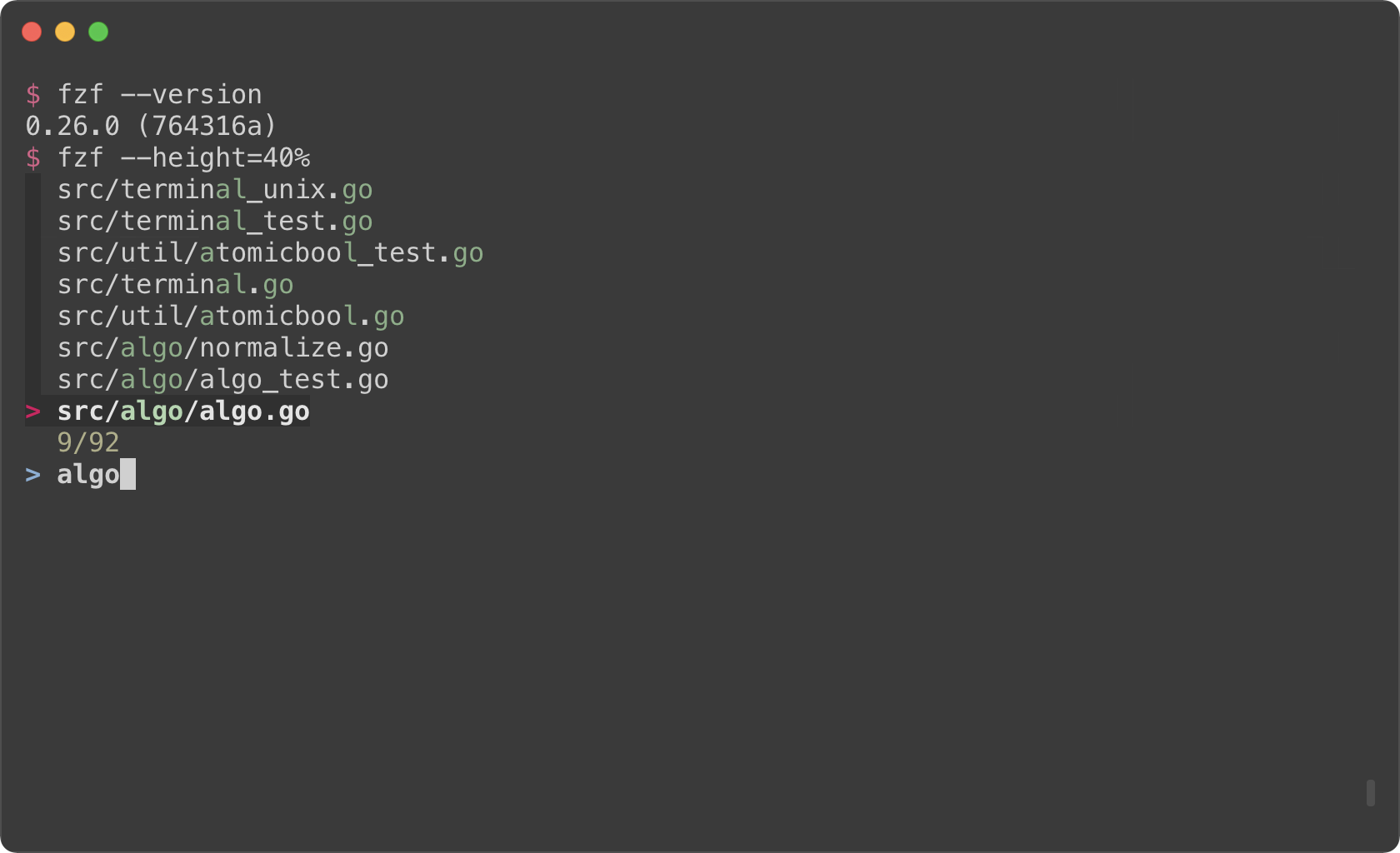
|
||||||
|
|
||||||
|
You might also want to experiment with other layout options such as
|
||||||
|
`--layout=reverse`, `--info=inline`, `--border`, `--margin`, etc.
|
||||||
|
|
||||||
|
```sh
|
||||||
|
fzf --height=40% --layout=reverse
|
||||||
|
fzf --height=40% --layout=reverse --info=inline
|
||||||
|
fzf --height=40% --layout=reverse --info=inline --border
|
||||||
|
fzf --height=40% --layout=reverse --info=inline --border --margin=1
|
||||||
|
fzf --height=40% --layout=reverse --info=inline --border --margin=1 --padding=1
|
||||||
|
```
|
||||||
|
|
||||||
|
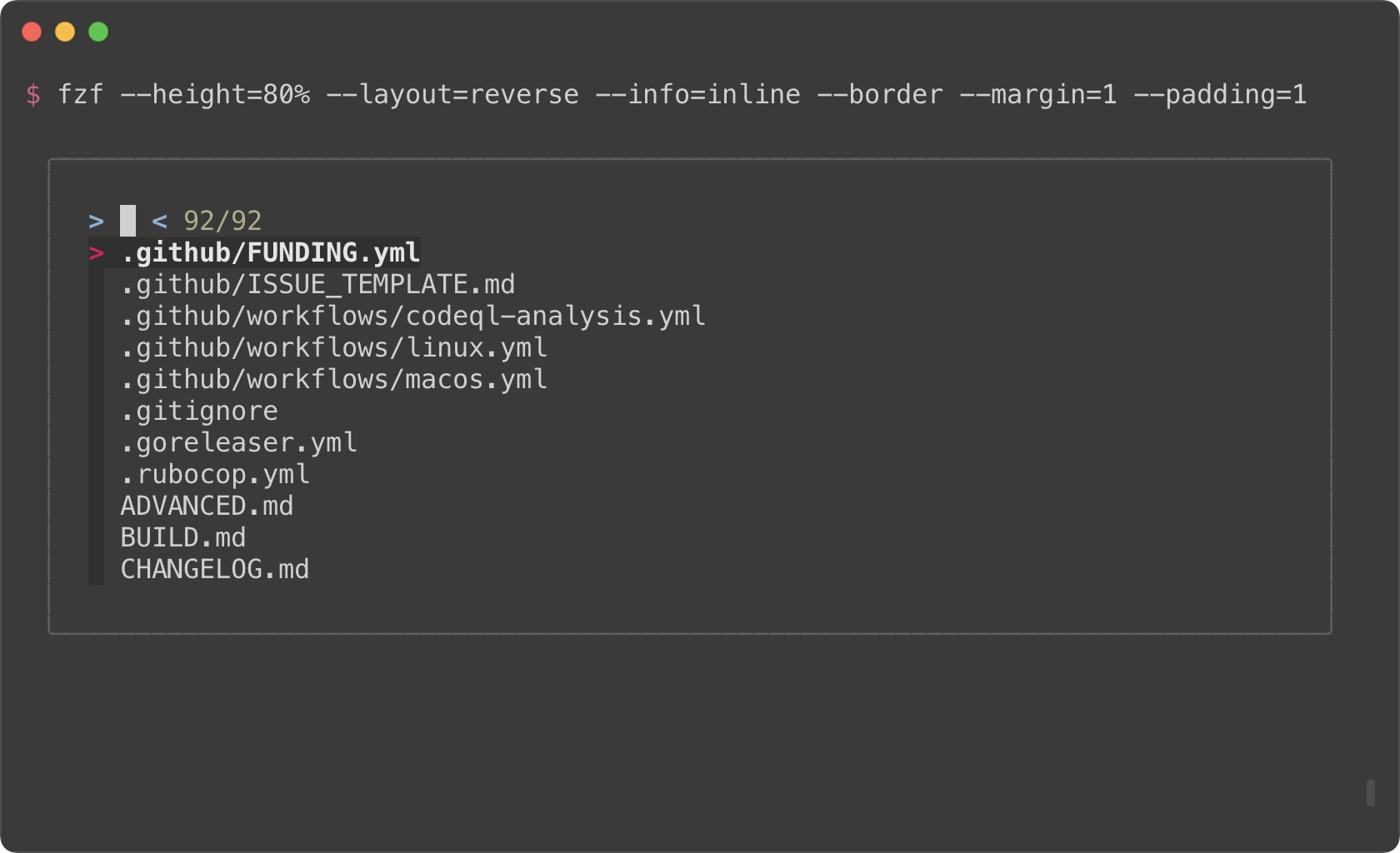
|
||||||
|
|
||||||
|
*(See `Layout` section of the man page to see the full list of options)*
|
||||||
|
|
||||||
|
But you definitely don't want to repeat `--height=40% --layout=reverse
|
||||||
|
--info=inline --border --margin=1 --padding=1` every time you use fzf. You
|
||||||
|
could write a wrapper script or shell alias, but there is an easier option.
|
||||||
|
Define `$FZF_DEFAULT_OPTS` like so:
|
||||||
|
|
||||||
|
```sh
|
||||||
|
export FZF_DEFAULT_OPTS="--height=40% --layout=reverse --info=inline --border --margin=1 --padding=1"
|
||||||
|
```
|
||||||
|
|
||||||
|
### `fzf-tmux`
|
||||||
|
|
||||||
|
Before fzf had `--height` option, we would open fzf in a tmux split pane not
|
||||||
|
to take up the whole screen. This is done using `fzf-tmux` script.
|
||||||
|
|
||||||
|
```sh
|
||||||
|
# Open fzf on a tmux split pane below the current pane.
|
||||||
|
# Takes the same set of options.
|
||||||
|
fzf-tmux --layout=reverse
|
||||||
|
```
|
||||||
|
|
||||||
|
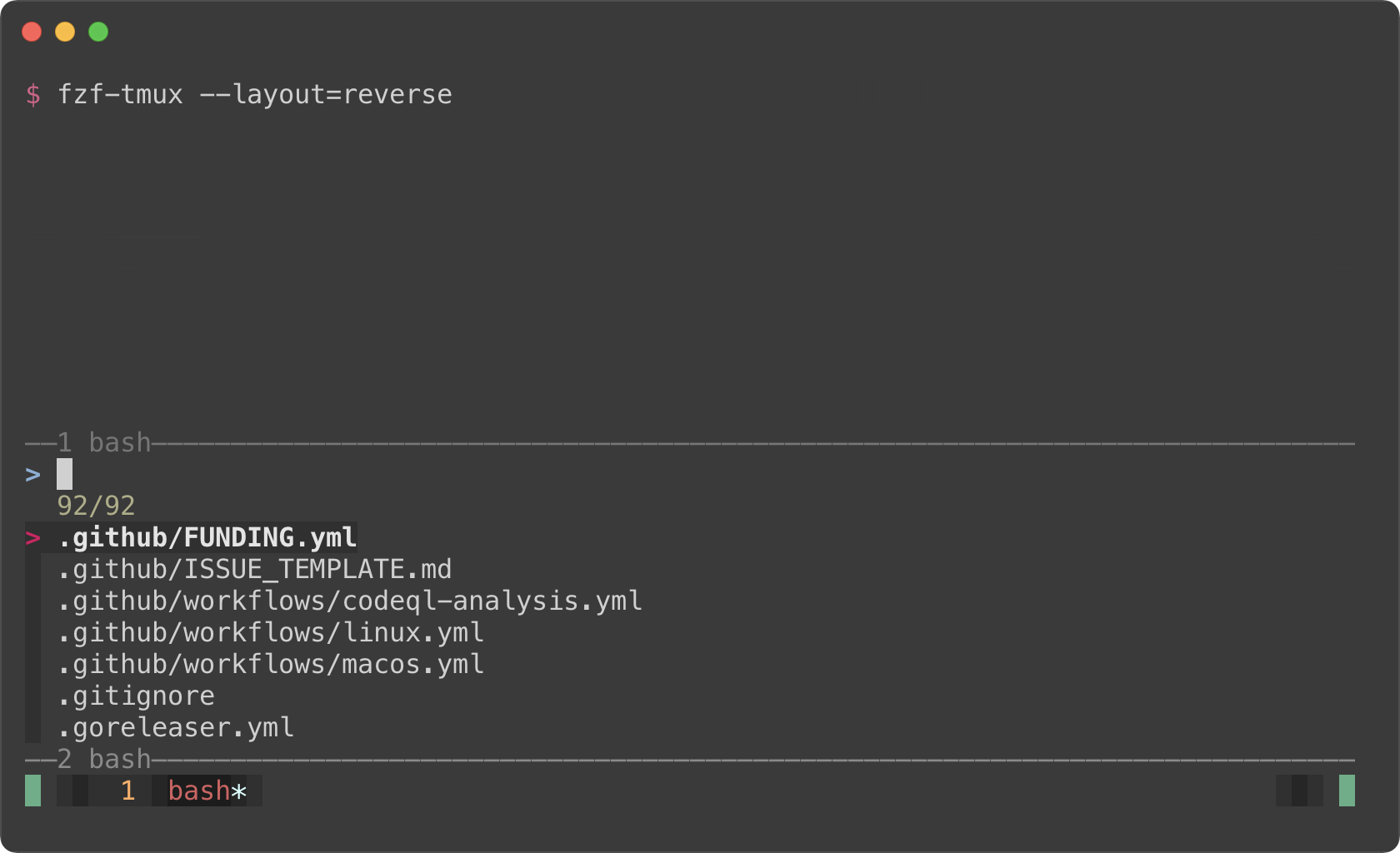
|
||||||
|
|
||||||
|
The limitation of `fzf-tmux` is that it only works when you're on tmux unlike
|
||||||
|
`--height` option. But the advantage of it is that it's more flexible.
|
||||||
|
(See `man fzf-tmux` for available options.)
|
||||||
|
|
||||||
|
```sh
|
||||||
|
# On the right (50%)
|
||||||
|
fzf-tmux -r
|
||||||
|
|
||||||
|
# On the left (30%)
|
||||||
|
fzf-tmux -l30%
|
||||||
|
|
||||||
|
# Above the cursor
|
||||||
|
fzf-tmux -u30%
|
||||||
|
```
|
||||||
|
|
||||||
|
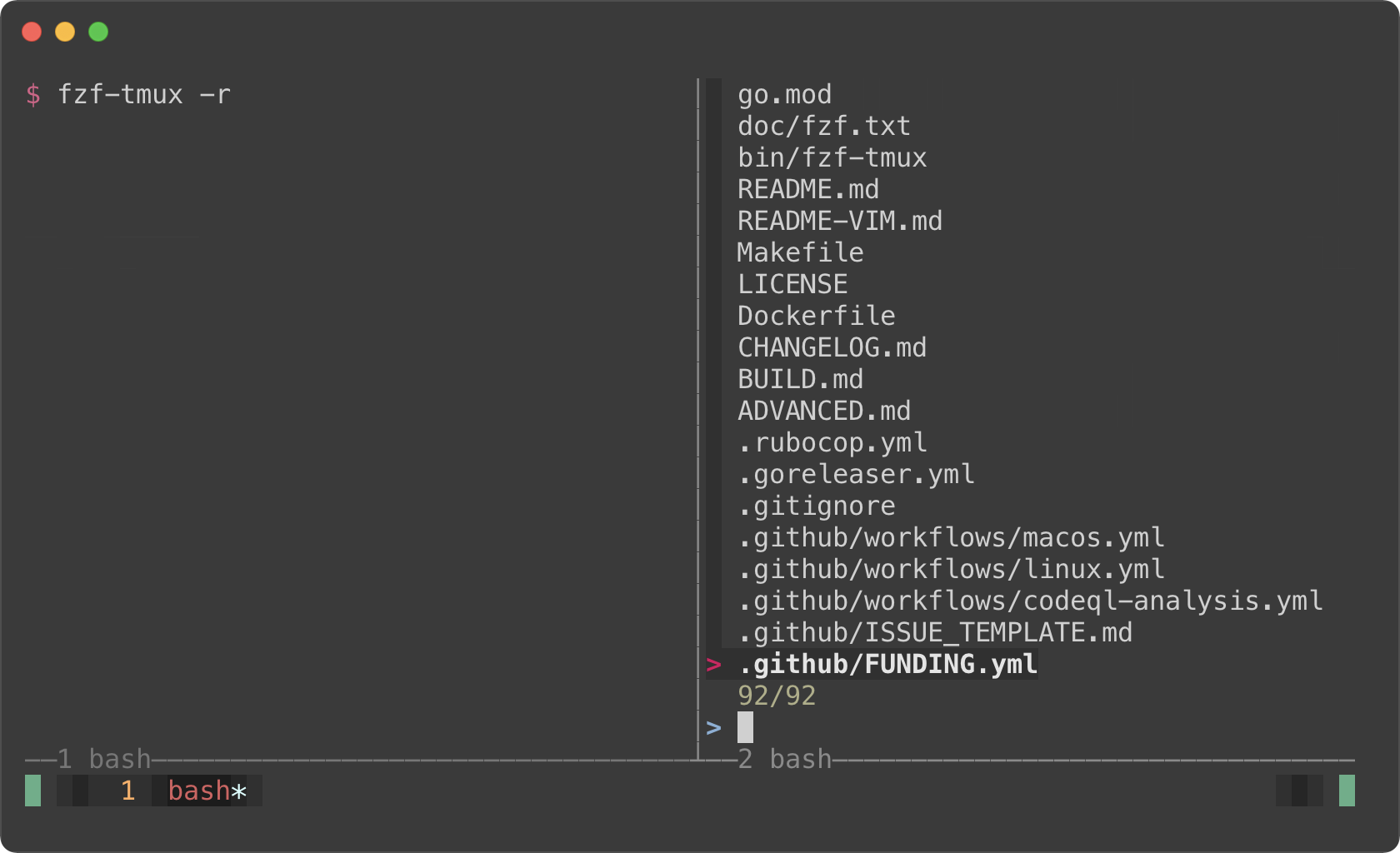
|
||||||
|
|
||||||
|
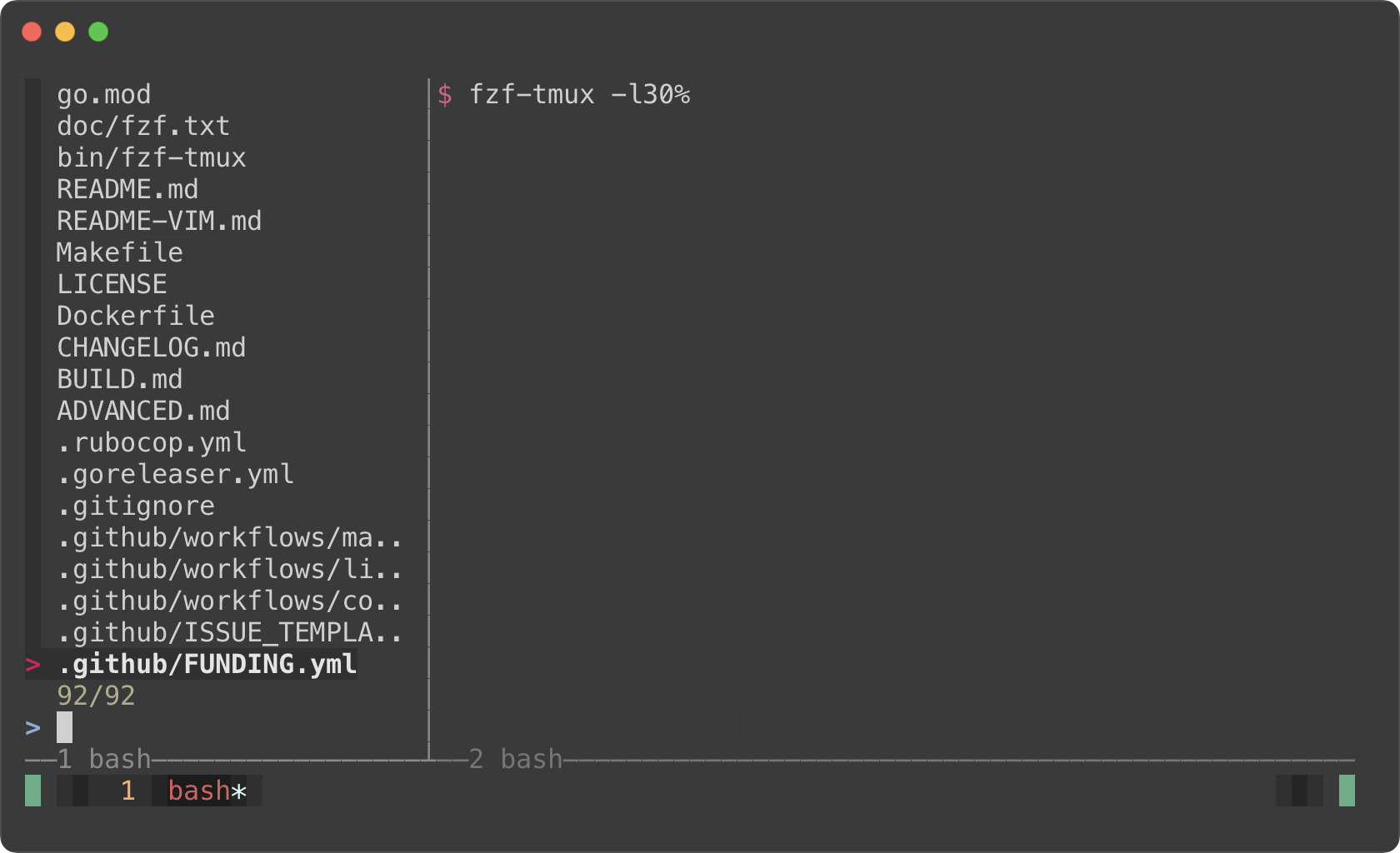
|
||||||
|
|
||||||
|
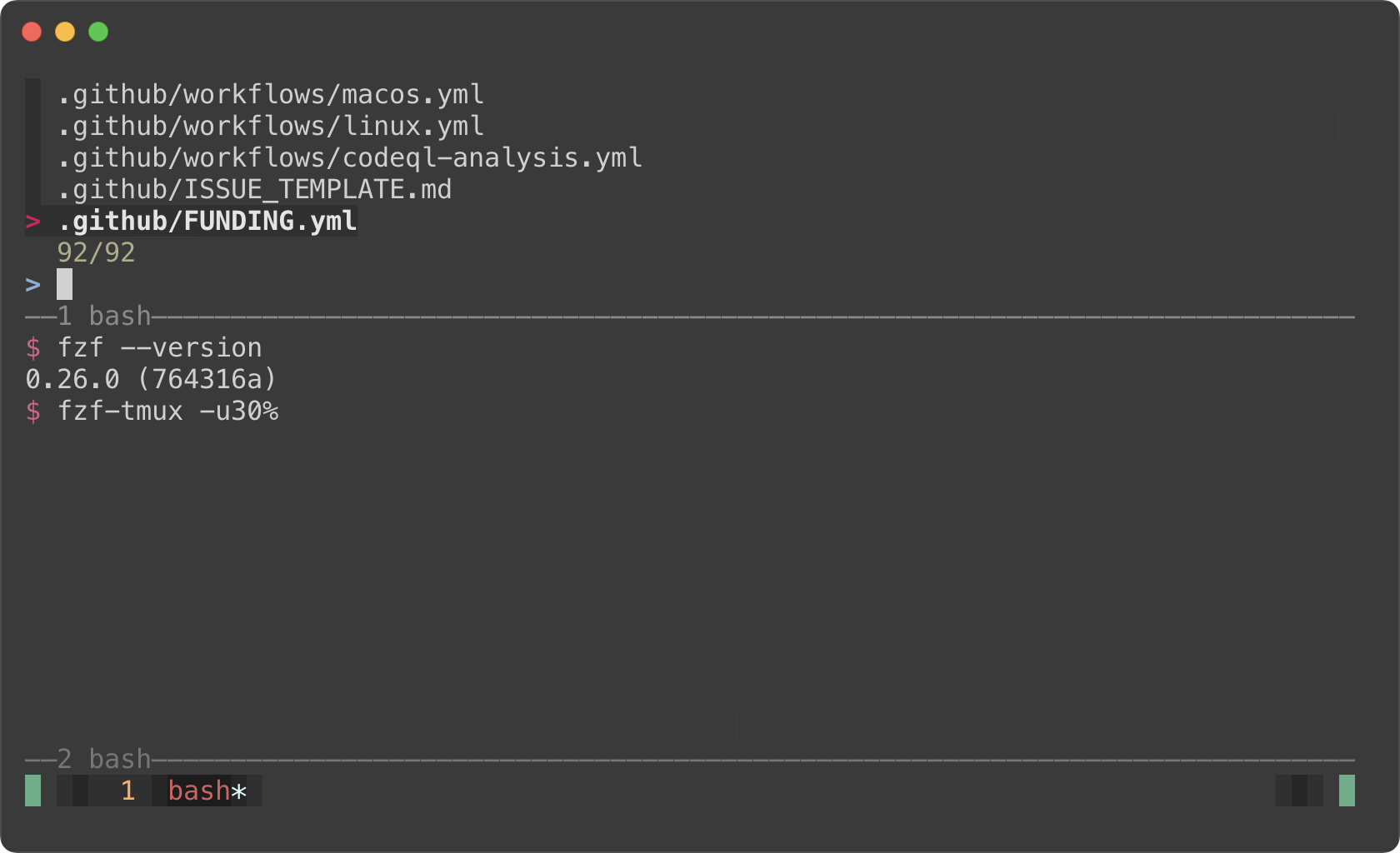
|
||||||
|
|
||||||
|
#### Popup window support
|
||||||
|
|
||||||
|
But here's the really cool part; tmux 3.2 added support for popup windows. So
|
||||||
|
you can open fzf in a popup window, which is quite useful if you frequently
|
||||||
|
use split panes.
|
||||||
|
|
||||||
|
```sh
|
||||||
|
# Open tmux in a tmux popup window (default size: 50% of the screen)
|
||||||
|
fzf-tmux -p
|
||||||
|
|
||||||
|
# 80% width, 60% height
|
||||||
|
fzf-tmux -p 80%,60%
|
||||||
|
```
|
||||||
|
|
||||||
|
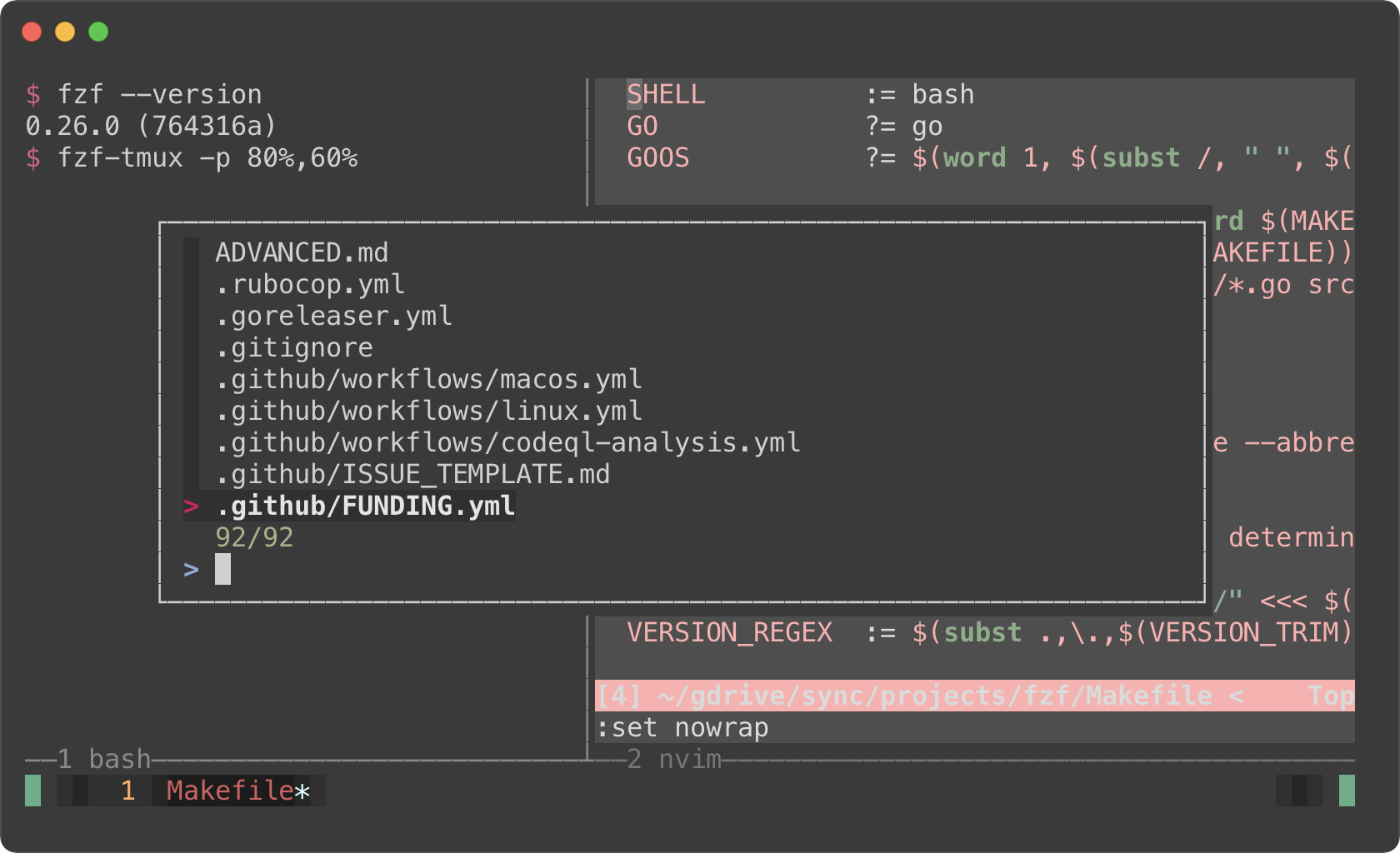
|
||||||
|
|
||||||
|
> You might also want to check out my tmux plugins which support this popup
|
||||||
|
> window layout.
|
||||||
|
>
|
||||||
|
> - https://github.com/junegunn/tmux-fzf-url
|
||||||
|
> - https://github.com/junegunn/tmux-fzf-maccy
|
||||||
|
|
||||||
|
Dynamic reloading of the list
|
||||||
|
-----------------------------
|
||||||
|
|
||||||
|
fzf can dynamically update the candidate list using an arbitrary program with
|
||||||
|
`reload` bindings (The design document for `reload` can be found
|
||||||
|
[here][reload]).
|
||||||
|
|
||||||
|
[reload]: https://github.com/junegunn/fzf/issues/1750
|
||||||
|
|
||||||
|
### Updating the list of processes by pressing CTRL-R
|
||||||
|
|
||||||
|
This example shows how you can set up a binding for dynamically updating the
|
||||||
|
list without restarting fzf.
|
||||||
|
|
||||||
|
```sh
|
||||||
|
(date; ps -ef) |
|
||||||
|
fzf --bind='ctrl-r:reload(date; ps -ef)' \
|
||||||
|
--header=$'Press CTRL-R to reload\n\n' --header-lines=2 \
|
||||||
|
--preview='echo {}' --preview-window=down,3,wrap \
|
||||||
|
--layout=reverse --height=80% | awk '{print $2}' | xargs kill -9
|
||||||
|
```
|
||||||
|
|
||||||
|
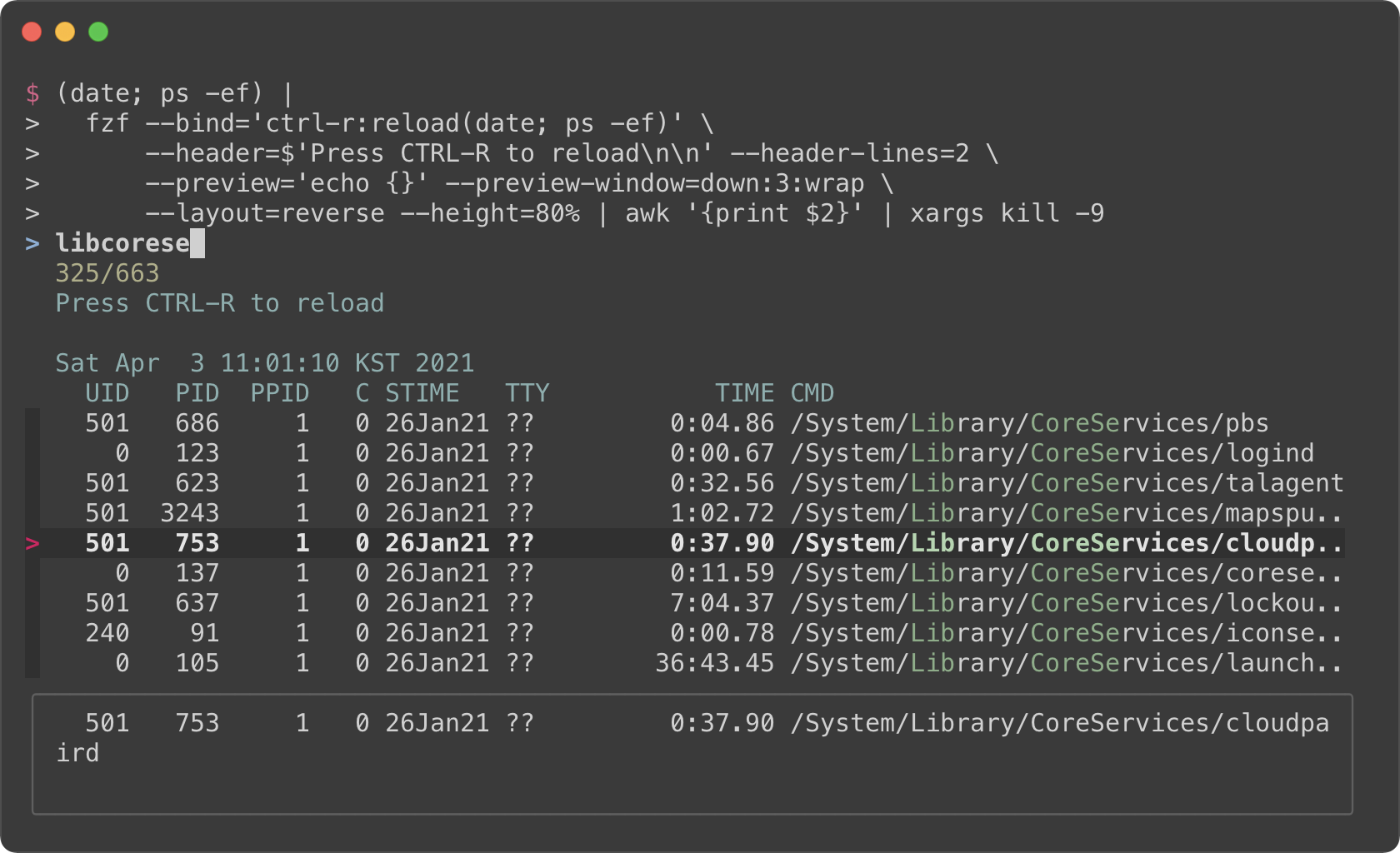
|
||||||
|
|
||||||
|
- The initial command is `(date; ps -ef)`. It prints the current date and
|
||||||
|
time, and the list of the processes.
|
||||||
|
- With `--header` option, you can show any message as the fixed header.
|
||||||
|
- To disallow selecting the first two lines (`date` and `ps` header), we use
|
||||||
|
`--header-lines=2` option.
|
||||||
|
- `--bind='ctrl-r:reload(date; ps -ef)'` binds CTRL-R to `reload` action that
|
||||||
|
runs `date; ps -ef`, so we can update the list of the processes by pressing
|
||||||
|
CTRL-R.
|
||||||
|
- We use simple `echo {}` preview option, so we can see the entire line on the
|
||||||
|
preview window below even if it's too long
|
||||||
|
|
||||||
|
### Toggling between data sources
|
||||||
|
|
||||||
|
You're not limiited to just one reload binding. Set up multiple bindings so
|
||||||
|
you can switch between data sources.
|
||||||
|
|
||||||
|
```sh
|
||||||
|
find * | fzf --prompt 'All> ' \
|
||||||
|
--header 'CTRL-D: Directories / CTRL-F: Files' \
|
||||||
|
--bind 'ctrl-d:change-prompt(Directories> )+reload(find * -type d)' \
|
||||||
|
--bind 'ctrl-f:change-prompt(Files> )+reload(find * -type f)'
|
||||||
|
```
|
||||||
|
|
||||||
|
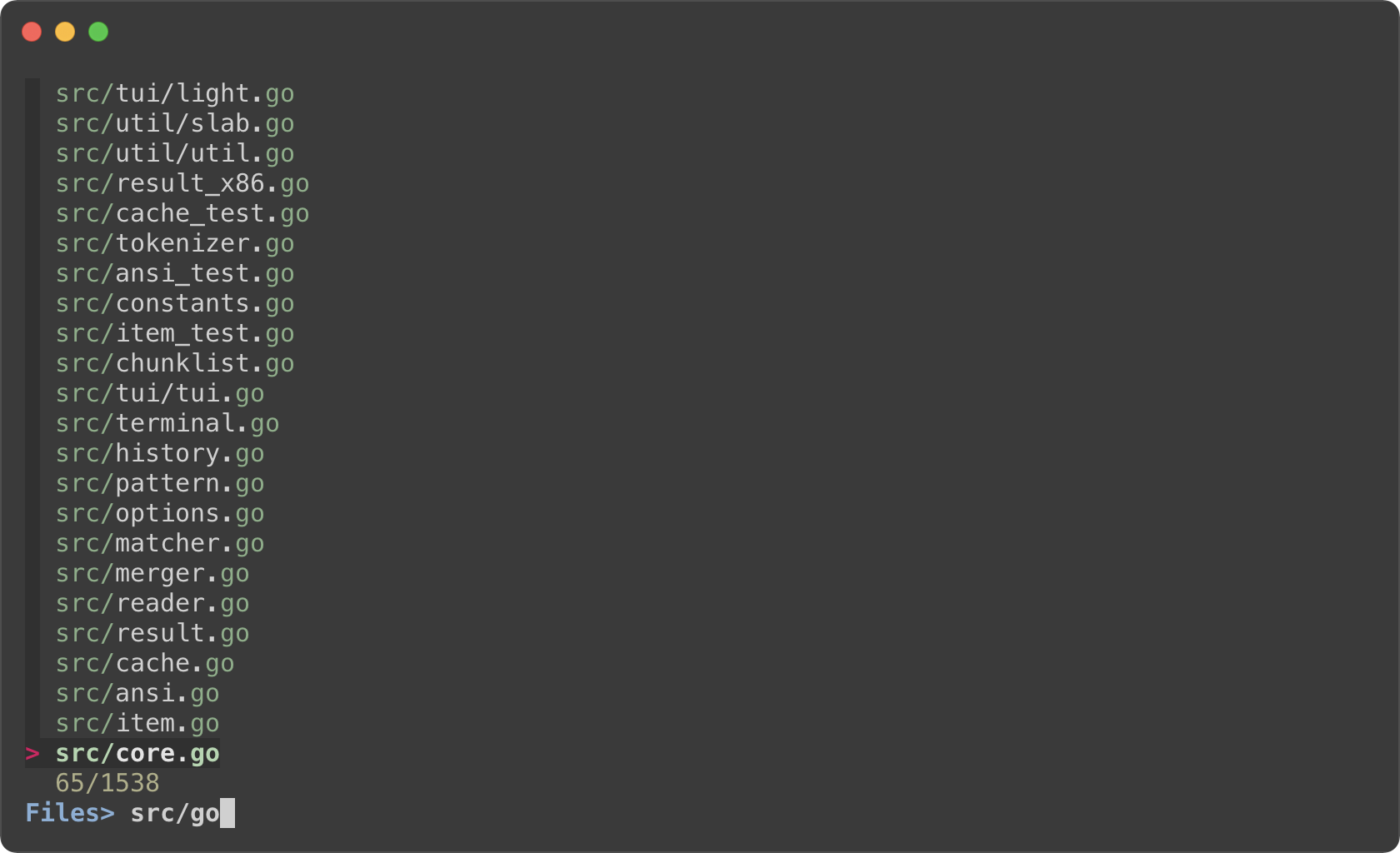
|
||||||
|
|
||||||
|
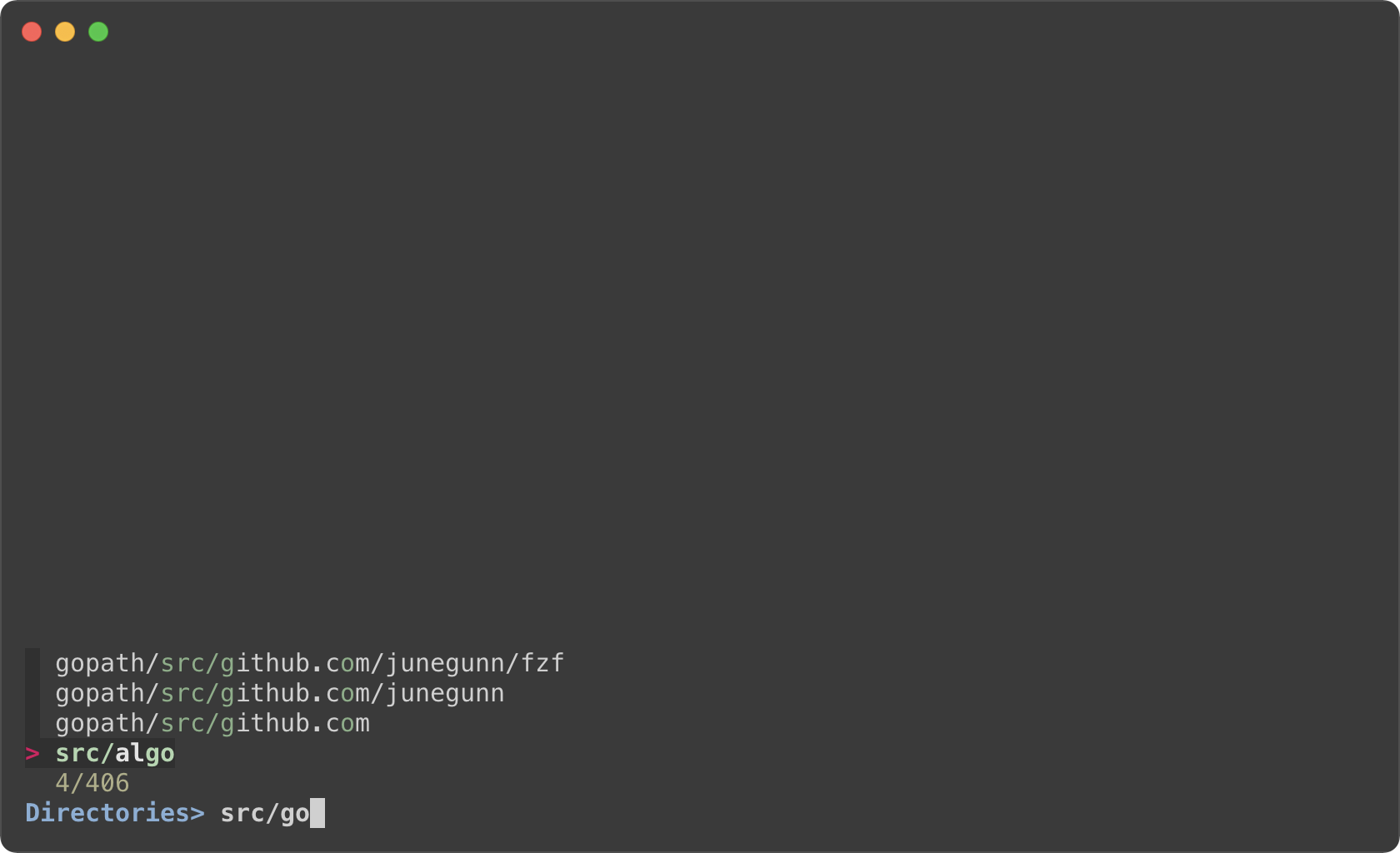
|
||||||
|
|
||||||
|
Ripgrep integration
|
||||||
|
-------------------
|
||||||
|
|
||||||
|
### Using fzf as the secondary filter
|
||||||
|
|
||||||
|
* Requires [bat][bat]
|
||||||
|
* Requires [Ripgrep][rg]
|
||||||
|
|
||||||
|
[bat]: https://github.com/sharkdp/bat
|
||||||
|
[rg]: https://github.com/BurntSushi/ripgrep
|
||||||
|
|
||||||
|
fzf is pretty fast for filtering a list that you will rarely have to think
|
||||||
|
about its performance. But it is not the right tool for searching for text
|
||||||
|
inside many large files, and in that case you should definitely use something
|
||||||
|
like [Ripgrep][rg].
|
||||||
|
|
||||||
|
In the next example, Ripgrep is the primary filter that searches for the given
|
||||||
|
text in files, and fzf is used as the secondary fuzzy filter that adds
|
||||||
|
interactivity to the workflow. And we use [bat][bat] to show the matching line in
|
||||||
|
the preview window.
|
||||||
|
|
||||||
|
This is a bash script and it will not run as expected on other non-compliant
|
||||||
|
shells. To avoid the compatibility issue, let's save this snippet as a script
|
||||||
|
file called `rfv`.
|
||||||
|
|
||||||
|
```bash
|
||||||
|
#!/usr/bin/env bash
|
||||||
|
|
||||||
|
# 1. Search for text in files using Ripgrep
|
||||||
|
# 2. Interactively narrow down the list using fzf
|
||||||
|
# 3. Open the file in Vim
|
||||||
|
IFS=: read -ra selected < <(
|
||||||
|
rg --color=always --line-number --no-heading --smart-case "${*:-}" |
|
||||||
|
fzf --ansi \
|
||||||
|
--color "hl:-1:underline,hl+:-1:underline:reverse" \
|
||||||
|
--delimiter : \
|
||||||
|
--preview 'bat --color=always {1} --highlight-line {2}' \
|
||||||
|
--preview-window 'up,60%,border-bottom,+{2}+3/3,~3'
|
||||||
|
)
|
||||||
|
[ -n "${selected[0]}" ] && vim "${selected[0]}" "+${selected[1]}"
|
||||||
|
```
|
||||||
|
|
||||||
|
And run it with an initial query string.
|
||||||
|
|
||||||
|
```sh
|
||||||
|
# Make the script executable
|
||||||
|
chmod +x rfv
|
||||||
|
|
||||||
|
# Run it with the initial query "algo"
|
||||||
|
./rfv algo
|
||||||
|
```
|
||||||
|
|
||||||
|
> Ripgrep will perform the initial search and list all the lines that contain
|
||||||
|
`algo`. Then we further narrow down the list on fzf.
|
||||||
|
|
||||||
|
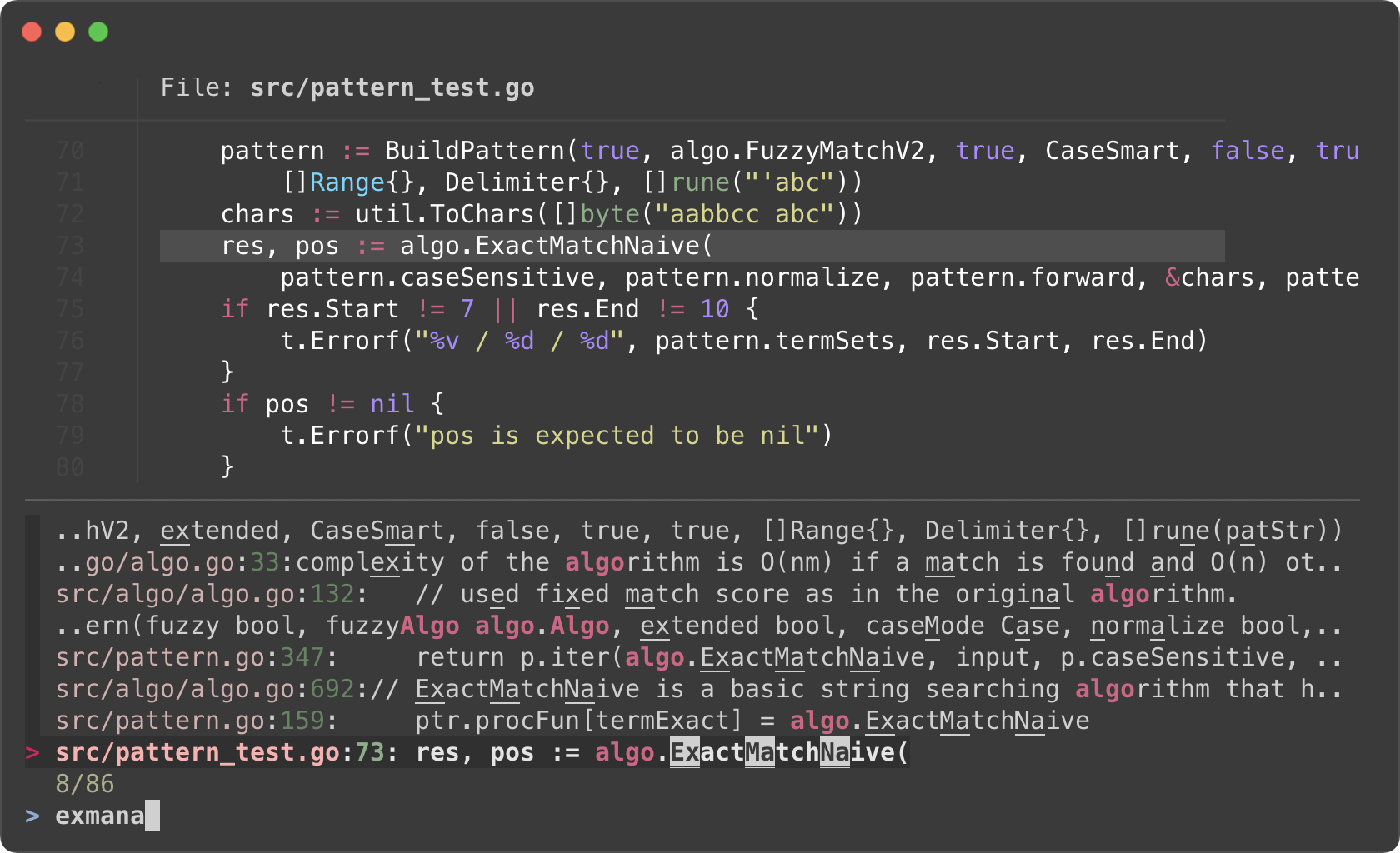
|
||||||
|
|
||||||
|
I know it's a lot to digest, let's try to break down the code.
|
||||||
|
|
||||||
|
- Ripgrep prints the matching lines in the following format
|
||||||
|
```
|
||||||
|
man/man1/fzf.1:54:.BI "--algo=" TYPE
|
||||||
|
man/man1/fzf.1:55:Fuzzy matching algorithm (default: v2)
|
||||||
|
man/man1/fzf.1:58:.BR v2 " Optimal scoring algorithm (quality)"
|
||||||
|
src/pattern_test.go:7: "github.com/junegunn/fzf/src/algo"
|
||||||
|
```
|
||||||
|
The first token delimited by `:` is the file path, and the second token is
|
||||||
|
the line number of the matching line. They respectively correspond to `{1}`
|
||||||
|
and `{2}` in the preview command.
|
||||||
|
- `--preview 'bat --color=always {1} --highlight-line {2}'`
|
||||||
|
- As we run `rg` with `--color=always` option, we should tell fzf to parse
|
||||||
|
ANSI color codes in the input by setting `--ansi`.
|
||||||
|
- We customize how fzf colors various text elements using `--color` option.
|
||||||
|
`-1` tells fzf to keep the original color from the input. See `man fzf` for
|
||||||
|
available color options.
|
||||||
|
- The value of `--preview-window` option consists of 5 components delimited
|
||||||
|
by `,`
|
||||||
|
1. `up` — Position of the preview window
|
||||||
|
1. `60%` — Size of the preview window
|
||||||
|
1. `border-bottom` — Preview window border only on the bottom side
|
||||||
|
1. `+{2}+3/3` — Scroll offset of the preview contents
|
||||||
|
1. `~3` — Fixed header
|
||||||
|
- Let's break down the latter two. We want to display the bat output in the
|
||||||
|
preview window with a certain scroll offset so that the matching line is
|
||||||
|
positioned near the center of the preview window.
|
||||||
|
- `+{2}` — The base offset is extracted from the second token
|
||||||
|
- `+3` — We add 3 lines to the base offset to compensate for the header
|
||||||
|
part of `bat` output
|
||||||
|
- ```
|
||||||
|
───────┬──────────────────────────────────────────────────────────
|
||||||
|
│ File: CHANGELOG.md
|
||||||
|
───────┼──────────────────────────────────────────────────────────
|
||||||
|
1 │ CHANGELOG
|
||||||
|
2 │ =========
|
||||||
|
3 │
|
||||||
|
4 │ 0.26.0
|
||||||
|
5 │ ------
|
||||||
|
```
|
||||||
|
- `/3` adjusts the offset so that the matching line is shown at a third
|
||||||
|
position in the window
|
||||||
|
- `~3` makes the top three lines fixed header so that they are always
|
||||||
|
visible regardless of the scroll offset
|
||||||
|
- Once we selected a line, we open the file with `vim` (`vim
|
||||||
|
"${selected[0]}"`) and move the cursor to the line (`+${selected[1]}`).
|
||||||
|
|
||||||
|
### Using fzf as interative Ripgrep launcher
|
||||||
|
|
||||||
|
We have learned that we can bind `reload` action to a key (e.g.
|
||||||
|
`--bind=ctrl-r:execute(ps -ef)`). In the next example, we are going to **bind
|
||||||
|
`reload` action to `change` event** so that whenever the user *changes* the
|
||||||
|
query string on fzf, `reload` action is triggered.
|
||||||
|
|
||||||
|
Here is a variation of the above `rfv` script. fzf will restart Ripgrep every
|
||||||
|
time the user updates the query string on fzf. Searching and filtering is
|
||||||
|
completely done by Ripgrep, and fzf merely provides the interactive interface.
|
||||||
|
So we lose the "fuzziness", but the performance will be better on larger
|
||||||
|
projects, and it will free up memory as you narrow down the results.
|
||||||
|
|
||||||
|
```bash
|
||||||
|
#!/usr/bin/env bash
|
||||||
|
|
||||||
|
# 1. Search for text in files using Ripgrep
|
||||||
|
# 2. Interactively restart Ripgrep with reload action
|
||||||
|
# 3. Open the file in Vim
|
||||||
|
RG_PREFIX="rg --column --line-number --no-heading --color=always --smart-case "
|
||||||
|
INITIAL_QUERY="${*:-}"
|
||||||
|
IFS=: read -ra selected < <(
|
||||||
|
FZF_DEFAULT_COMMAND="$RG_PREFIX $(printf %q "$INITIAL_QUERY")" \
|
||||||
|
fzf --ansi \
|
||||||
|
--disabled --query "$INITIAL_QUERY" \
|
||||||
|
--bind "change:reload:sleep 0.1; $RG_PREFIX {q} || true" \
|
||||||
|
--delimiter : \
|
||||||
|
--preview 'bat --color=always {1} --highlight-line {2}' \
|
||||||
|
--preview-window 'up,60%,border-bottom,+{2}+3/3,~3'
|
||||||
|
)
|
||||||
|
[ -n "${selected[0]}" ] && vim "${selected[0]}" "+${selected[1]}"
|
||||||
|
```
|
||||||
|
|
||||||
|
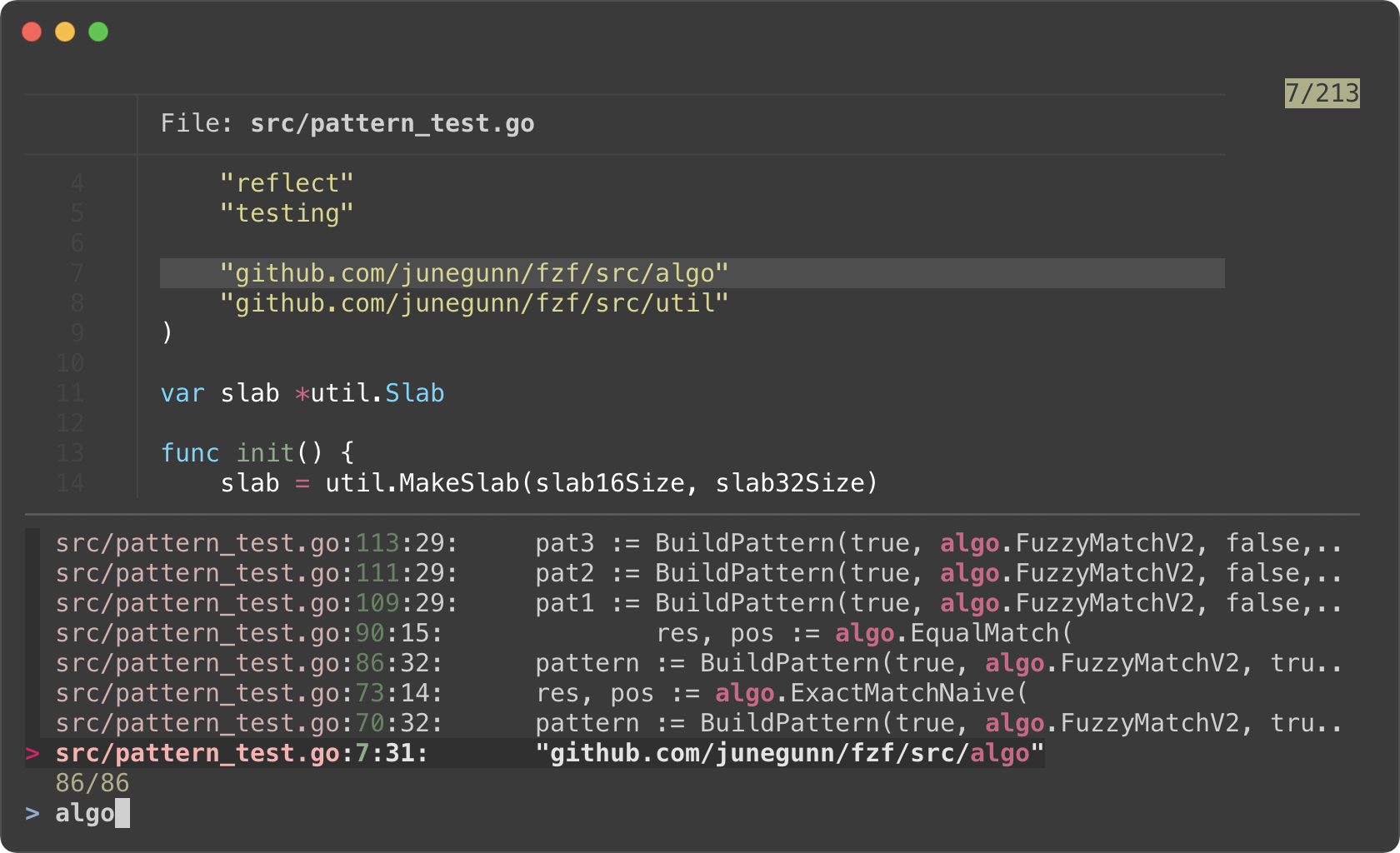
|
||||||
|
|
||||||
|
- Instead of starting fzf in `rg ... | fzf` form, we start fzf without an
|
||||||
|
explicit input, but with a custom `FZF_DEFAULT_COMMAND` variable. This way
|
||||||
|
fzf can kill the initial Ripgrep process it starts with the initial query.
|
||||||
|
Otherwise, the initial Ripgrep process will keep consuming system resources
|
||||||
|
even after `reload` is triggered.
|
||||||
|
- Filtering is no longer a responsibitiliy of fzf; hence `--disabled`
|
||||||
|
- `{q}` in the reload command evaluates to the query string on fzf prompt.
|
||||||
|
- `sleep 0.1` in the reload command is for "debouncing". This small delay will
|
||||||
|
reduce the number of intermediate Ripgrep processes while we're typing in
|
||||||
|
a query.
|
||||||
|
|
||||||
|
### Switching to fzf-only search mode
|
||||||
|
|
||||||
|
*(Requires fzf 0.27.1 or above)*
|
||||||
|
|
||||||
|
In the previous example, we lost fuzzy matching capability as we completely
|
||||||
|
delegated search functionality to Ripgrep. But we can dynamically switch to
|
||||||
|
fzf-only search mode by *"unbinding"* `reload` action from `change` event.
|
||||||
|
|
||||||
|
```sh
|
||||||
|
#!/usr/bin/env bash
|
||||||
|
|
||||||
|
# Two-phase filtering with Ripgrep and fzf
|
||||||
|
#
|
||||||
|
# 1. Search for text in files using Ripgrep
|
||||||
|
# 2. Interactively restart Ripgrep with reload action
|
||||||
|
# * Press alt-enter to switch to fzf-only filtering
|
||||||
|
# 3. Open the file in Vim
|
||||||
|
RG_PREFIX="rg --column --line-number --no-heading --color=always --smart-case "
|
||||||
|
INITIAL_QUERY="${*:-}"
|
||||||
|
IFS=: read -ra selected < <(
|
||||||
|
FZF_DEFAULT_COMMAND="$RG_PREFIX $(printf %q "$INITIAL_QUERY")" \
|
||||||
|
fzf --ansi \
|
||||||
|
--color "hl:-1:underline,hl+:-1:underline:reverse" \
|
||||||
|
--disabled --query "$INITIAL_QUERY" \
|
||||||
|
--bind "change:reload:sleep 0.1; $RG_PREFIX {q} || true" \
|
||||||
|
--bind "alt-enter:unbind(change,alt-enter)+change-prompt(2. fzf> )+enable-search+clear-query" \
|
||||||
|
--prompt '1. ripgrep> ' \
|
||||||
|
--delimiter : \
|
||||||
|
--preview 'bat --color=always {1} --highlight-line {2}' \
|
||||||
|
--preview-window 'up,60%,border-bottom,+{2}+3/3,~3'
|
||||||
|
)
|
||||||
|
[ -n "${selected[0]}" ] && vim "${selected[0]}" "+${selected[1]}"
|
||||||
|
```
|
||||||
|
|
||||||
|
* Phase 1. Filtering with Ripgrep
|
||||||
|
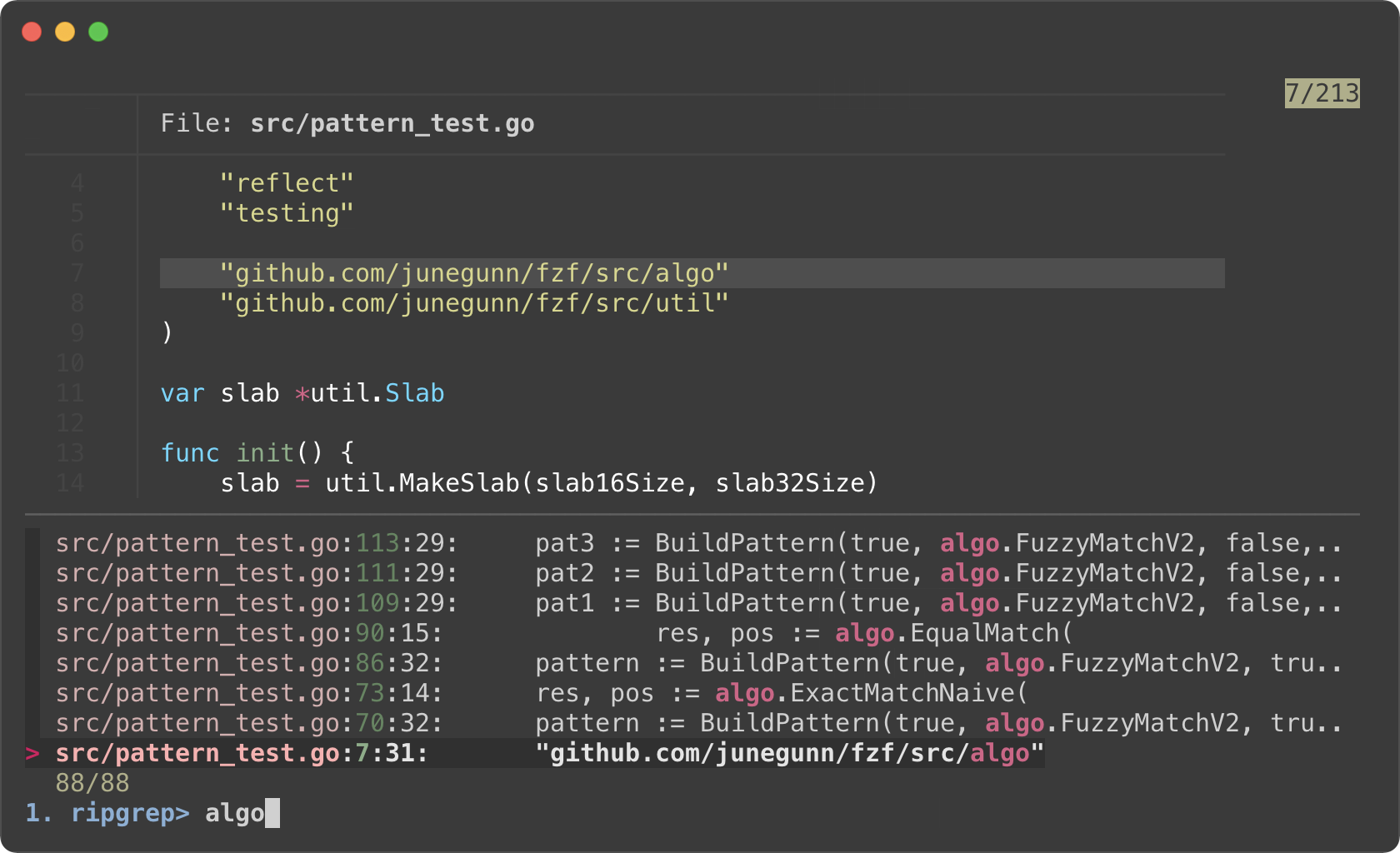
|
||||||
|
* Phase 2. Filtering with fzf
|
||||||
|
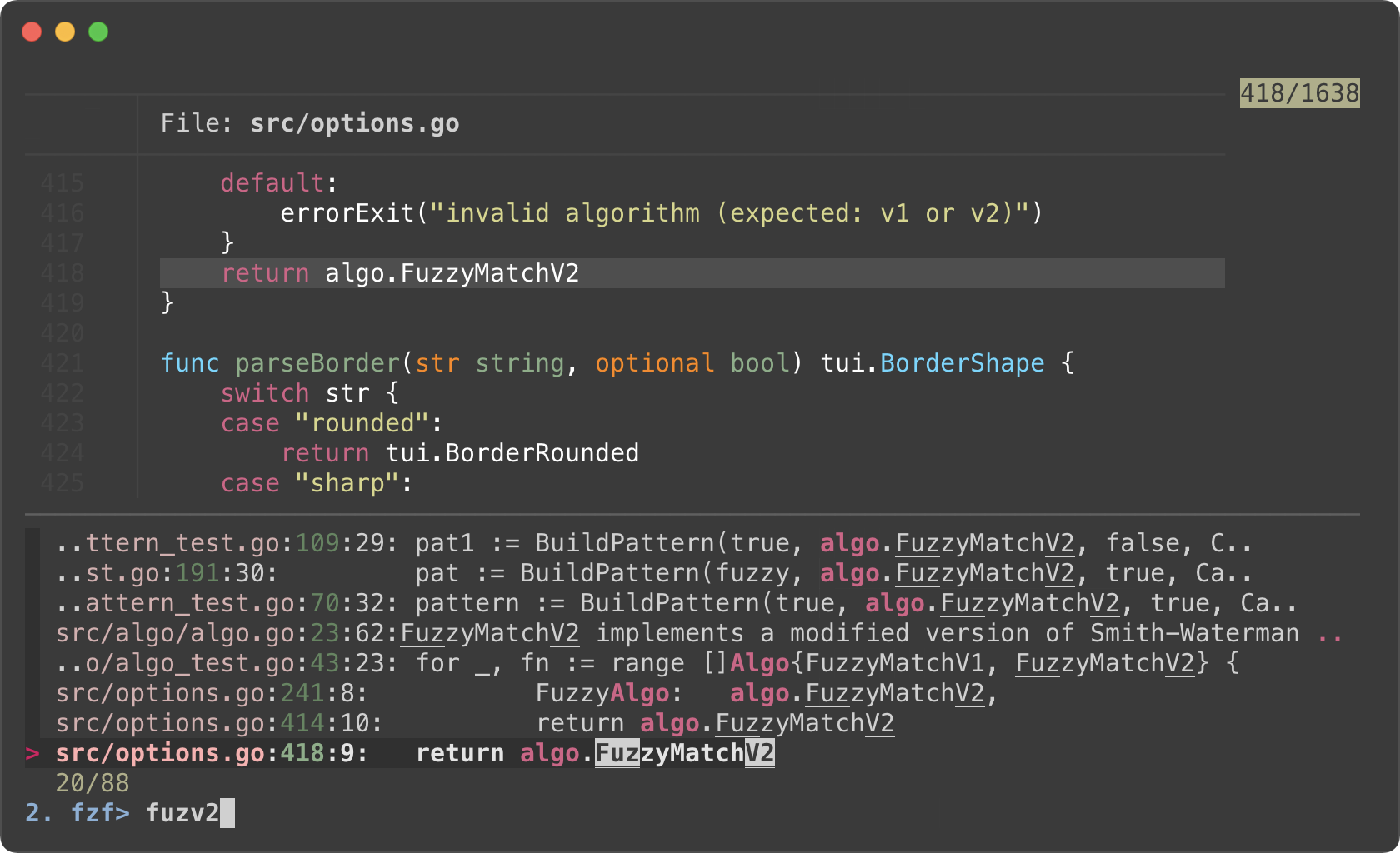
|
||||||
|
|
||||||
|
- We added `--prompt` option to show that fzf is initially running in "Ripgrep
|
||||||
|
launcher mode".
|
||||||
|
- We added `alt-enter` binding that
|
||||||
|
1. unbinds `change` event, so Ripgrep is no longer restarted on key press
|
||||||
|
2. changes the prompt to `2. fzf>`
|
||||||
|
3. enables search functionality of fzf
|
||||||
|
4. clears the current query string that was used to start Ripgrep process
|
||||||
|
5. and unbinds `alt-enter` itself as this is a one-off event
|
||||||
|
- We reverted `--color` option for customizing how the matching chunks are
|
||||||
|
displayed in the second phase
|
||||||
|
|
||||||
|
Log tailing
|
||||||
|
-----------
|
||||||
|
|
||||||
|
fzf can run long-running preview commands and render partial results before
|
||||||
|
completion. And when you specify `follow` flag in `--preview-window` option,
|
||||||
|
fzf will "`tail -f`" the result, automatically scrolling to the bottom.
|
||||||
|
|
||||||
|
```bash
|
||||||
|
# With "follow", preview window will automatically scroll to the bottom.
|
||||||
|
# "\033[2J" is an ANSI escape sequence for clearing the screen.
|
||||||
|
# When fzf reads this code it clears the previous preview contents.
|
||||||
|
fzf --preview-window follow --preview 'for i in $(seq 100000); do
|
||||||
|
echo "$i"
|
||||||
|
sleep 0.01
|
||||||
|
(( i % 300 == 0 )) && printf "\033[2J"
|
||||||
|
done'
|
||||||
|
```
|
||||||
|
|
||||||
|
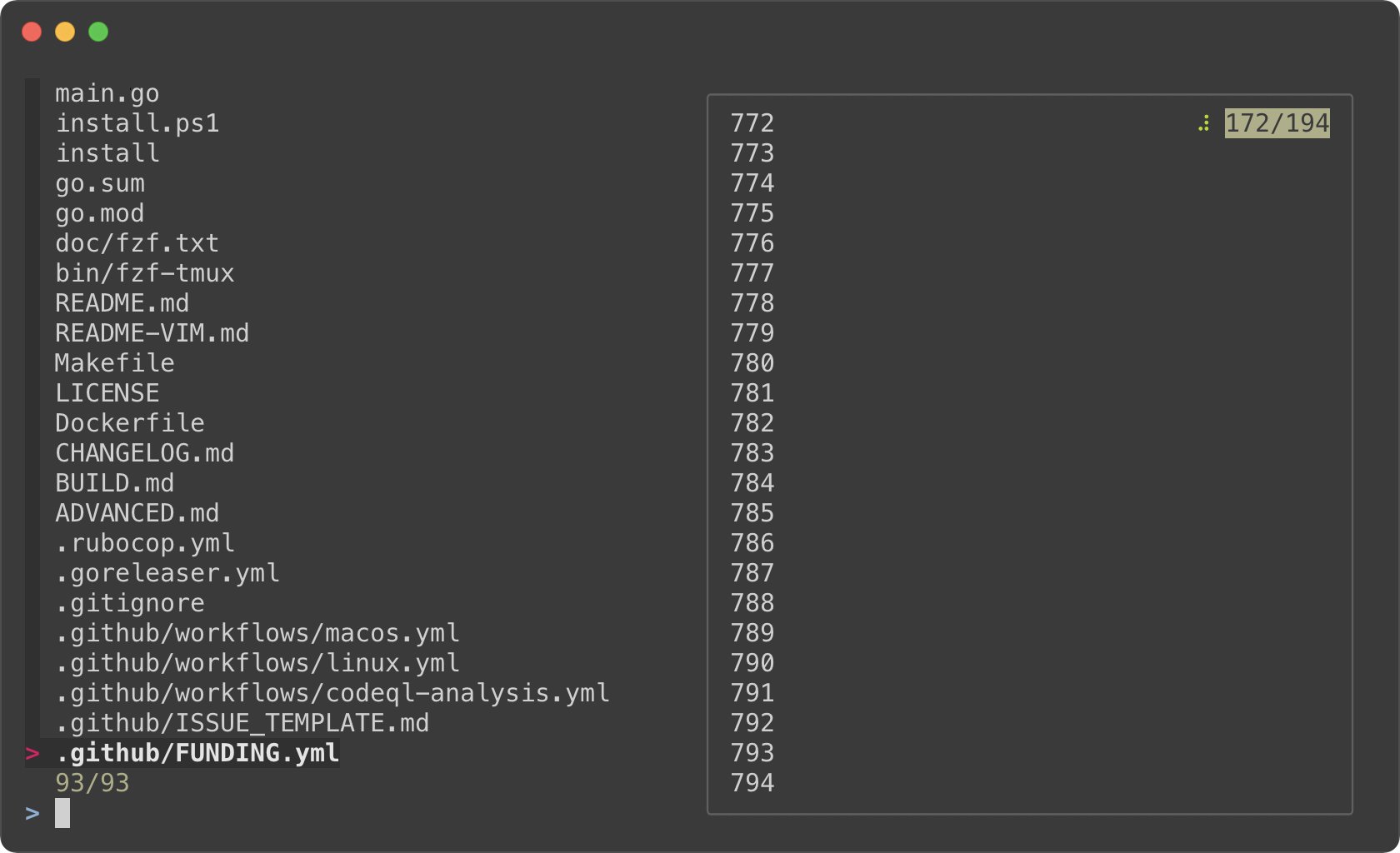
|
||||||
|
|
||||||
|
Admittedly, that was a silly example. Here's a practical one for browsing
|
||||||
|
Kubernetes pods.
|
||||||
|
|
||||||
|
```bash
|
||||||
|
#!/usr/bin/env bash
|
||||||
|
|
||||||
|
read -ra tokens < <(
|
||||||
|
kubectl get pods --all-namespaces |
|
||||||
|
fzf --info=inline --layout=reverse --header-lines=1 --border \
|
||||||
|
--prompt "$(kubectl config current-context | sed 's/-context$//')> " \
|
||||||
|
--header $'Press CTRL-O to open log in editor\n\n' \
|
||||||
|
--bind ctrl-/:toggle-preview \
|
||||||
|
--bind 'ctrl-o:execute:${EDITOR:-vim} <(kubectl logs --namespace {1} {2}) > /dev/tty' \
|
||||||
|
--preview-window up,follow \
|
||||||
|
--preview 'kubectl logs --follow --tail=100000 --namespace {1} {2}' "$@"
|
||||||
|
)
|
||||||
|
[ ${#tokens} -gt 1 ] &&
|
||||||
|
kubectl exec -it --namespace "${tokens[0]}" "${tokens[1]}" -- bash
|
||||||
|
```
|
||||||
|
|
||||||
|
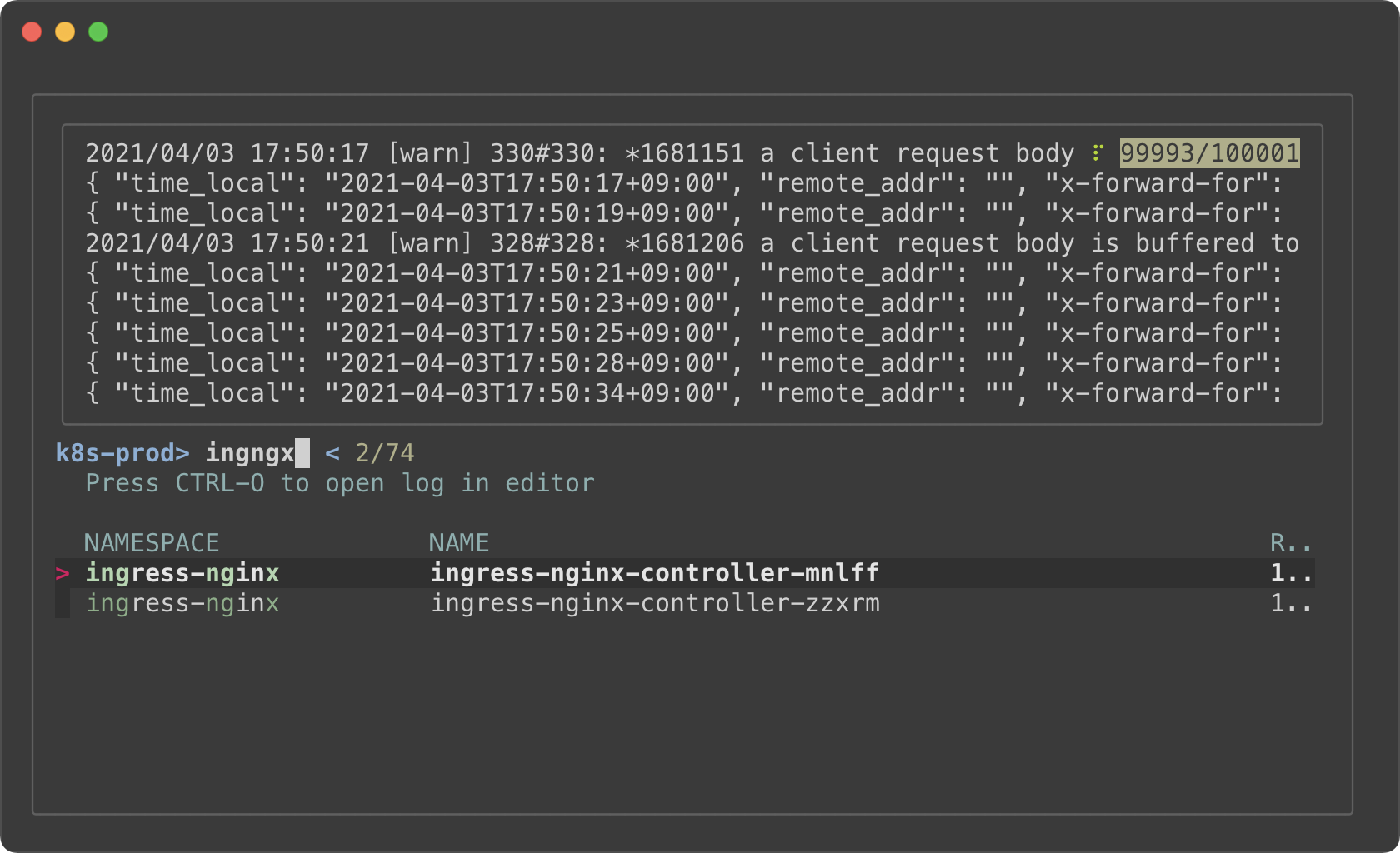
|
||||||
|
|
||||||
|
- The preview window will *"log tail"* the pod
|
||||||
|
- Holding on to a large amount of log will consume a lot of memory. So we
|
||||||
|
limited the initial log amount with `--tail=100000`.
|
||||||
|
- With `execute` binding, you can press CTRL-O to open the log in your editor
|
||||||
|
without leaving fzf
|
||||||
|
- Select a pod (with an enter key) to `kubectl exec` into it
|
||||||
|
|
||||||
|
Key bindings for git objects
|
||||||
|
----------------------------
|
||||||
|
|
||||||
|
I have [blogged](https://junegunn.kr/2016/07/fzf-git) about my fzf+git key
|
||||||
|
bindings a few years ago. I'm going to show them here again, because they are
|
||||||
|
seriously useful.
|
||||||
|
|
||||||
|
### Files listed in `git status`
|
||||||
|
|
||||||
|
<kbd>CTRL-G</kbd><kbd>CTRL-F</kbd>
|
||||||
|
|
||||||
|
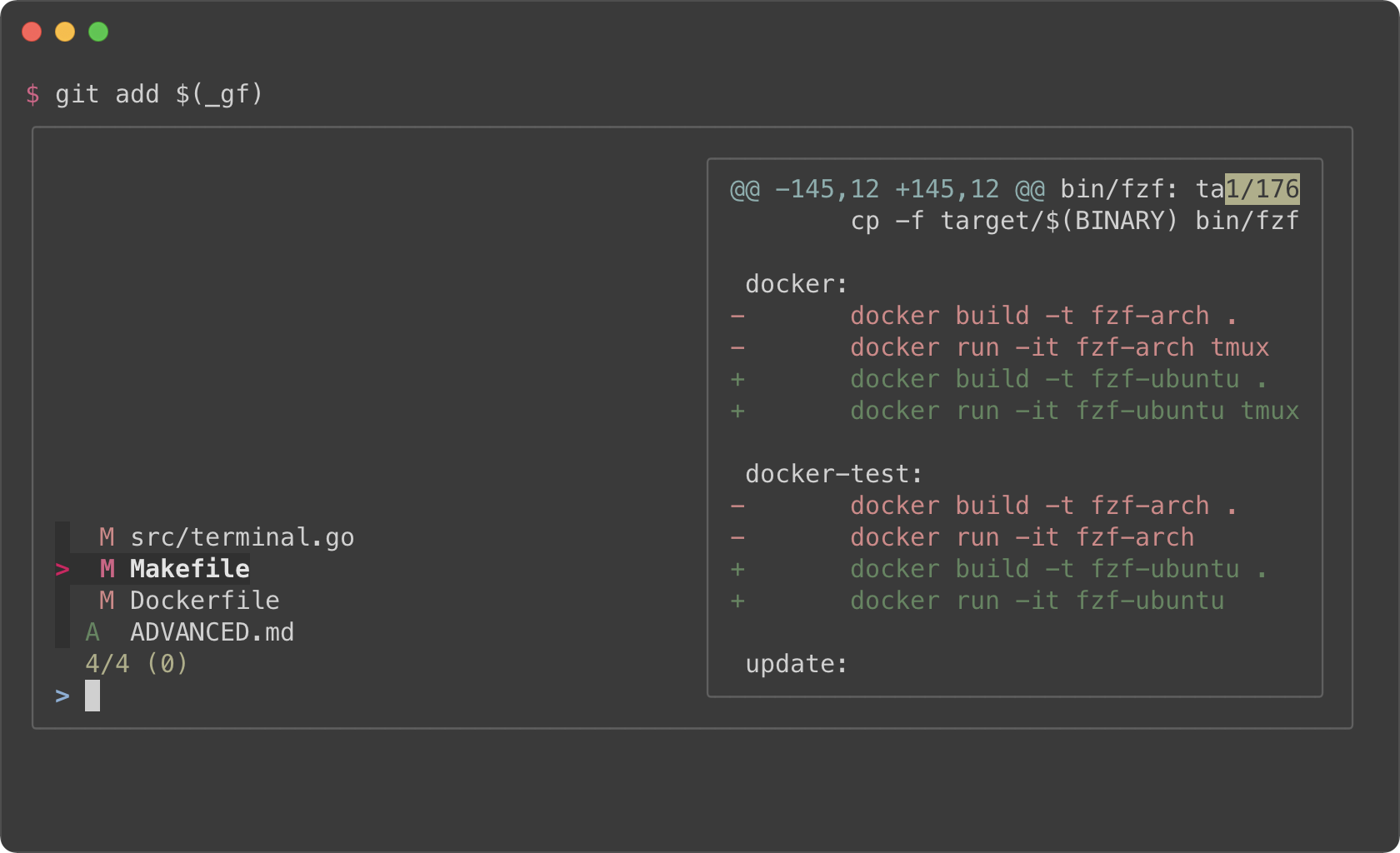
|
||||||
|
|
||||||
|
### Branches
|
||||||
|
|
||||||
|
<kbd>CTRL-G</kbd><kbd>CTRL-B</kbd>
|
||||||
|
|
||||||
|
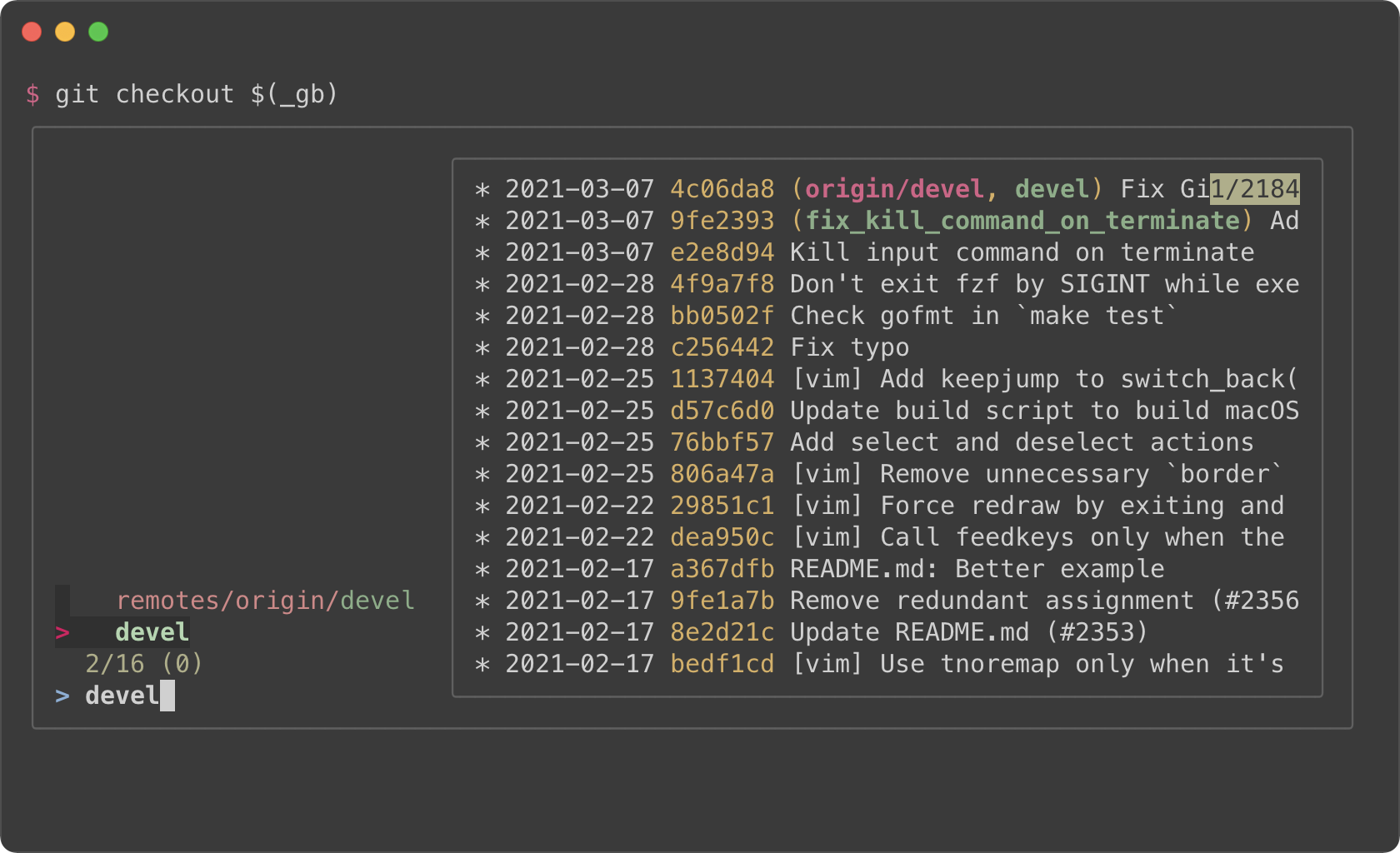
|
||||||
|
|
||||||
|
### Commit hashes
|
||||||
|
|
||||||
|
<kbd>CTRL-G</kbd><kbd>CTRL-H</kbd>
|
||||||
|
|
||||||
|
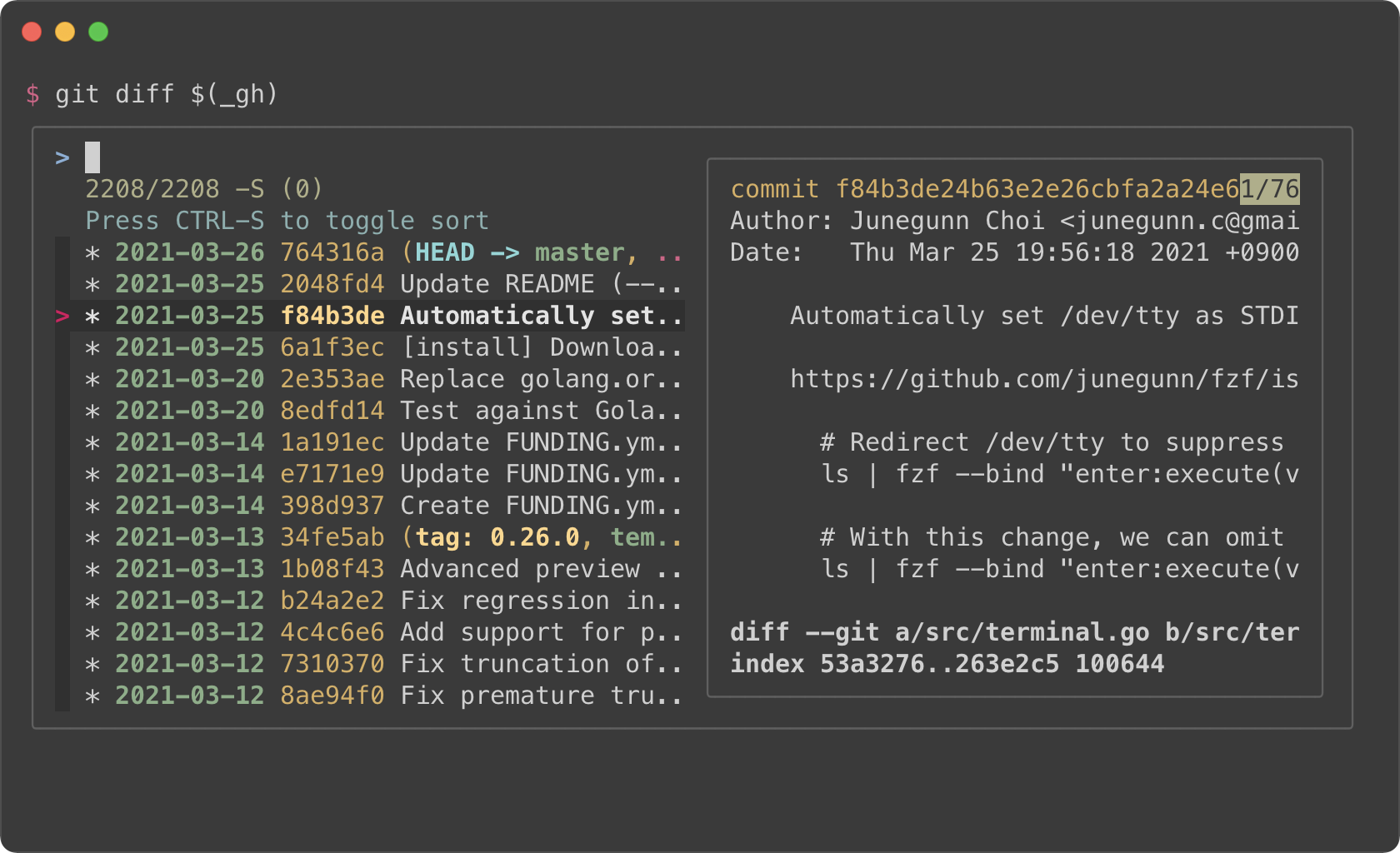
|
||||||
|
|
||||||
|
|
||||||
|
The full source code can be found [here](https://gist.github.com/junegunn/8b572b8d4b5eddd8b85e5f4d40f17236).
|
||||||
|
|
||||||
|
Color themes
|
||||||
|
------------
|
||||||
|
|
||||||
|
You can customize how fzf colors the text elements with `--color` option. Here
|
||||||
|
are a few color themes. Note that you need a terminal emulator that can
|
||||||
|
display 24-bit colors.
|
||||||
|
|
||||||
|
```sh
|
||||||
|
# junegunn/seoul256.vim (dark)
|
||||||
|
export FZF_DEFAULT_OPTS='--color=bg+:#3F3F3F,bg:#4B4B4B,border:#6B6B6B,spinner:#98BC99,hl:#719872,fg:#D9D9D9,header:#719872,info:#BDBB72,pointer:#E12672,marker:#E17899,fg+:#D9D9D9,preview-bg:#3F3F3F,prompt:#98BEDE,hl+:#98BC99'
|
||||||
|
```
|
||||||
|
|
||||||
|
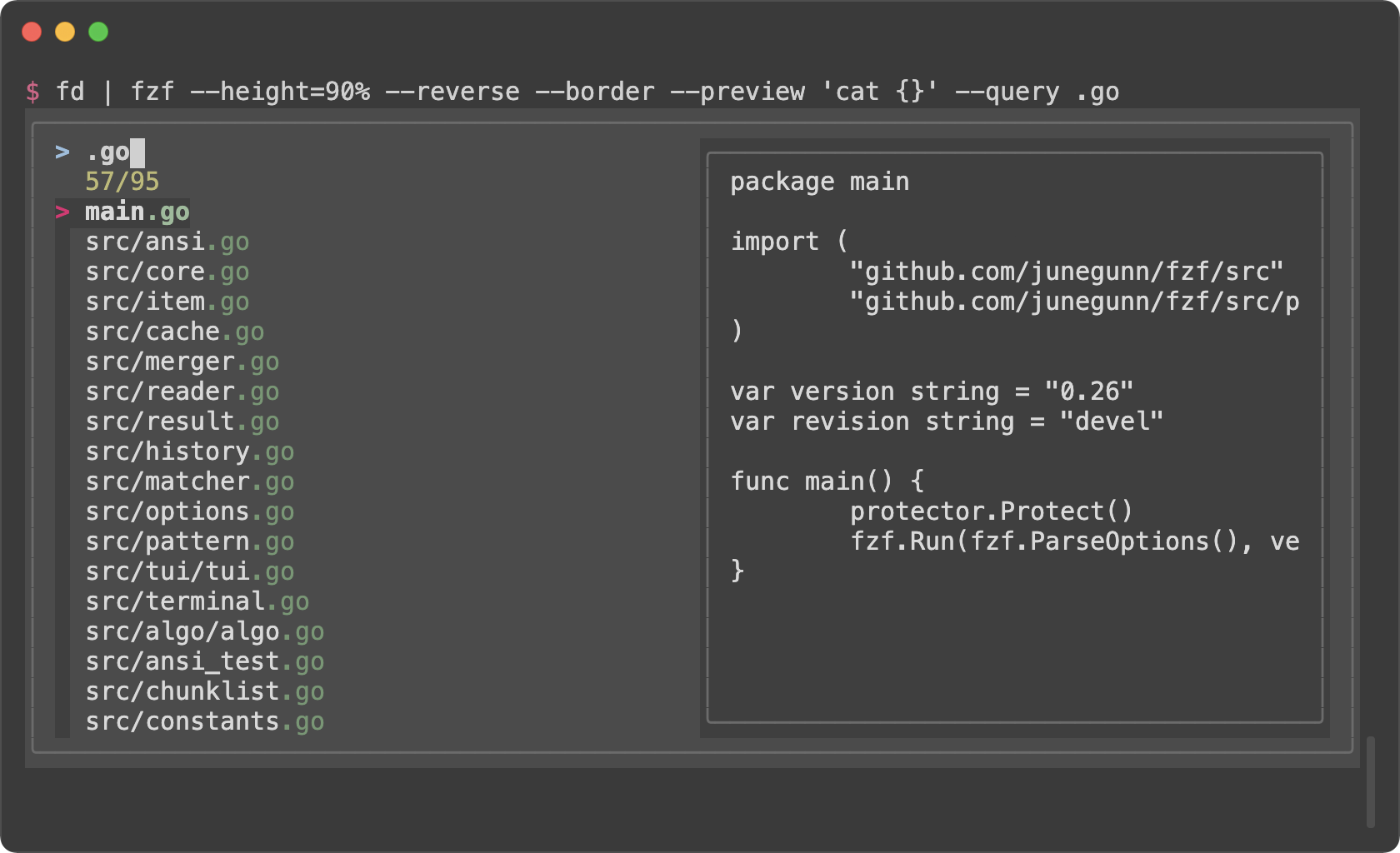
|
||||||
|
|
||||||
|
```sh
|
||||||
|
# junegunn/seoul256.vim (light)
|
||||||
|
export FZF_DEFAULT_OPTS='--color=bg+:#D9D9D9,bg:#E1E1E1,border:#C8C8C8,spinner:#719899,hl:#719872,fg:#616161,header:#719872,info:#727100,pointer:#E12672,marker:#E17899,fg+:#616161,preview-bg:#D9D9D9,prompt:#0099BD,hl+:#719899'
|
||||||
|
```
|
||||||
|
|
||||||
|
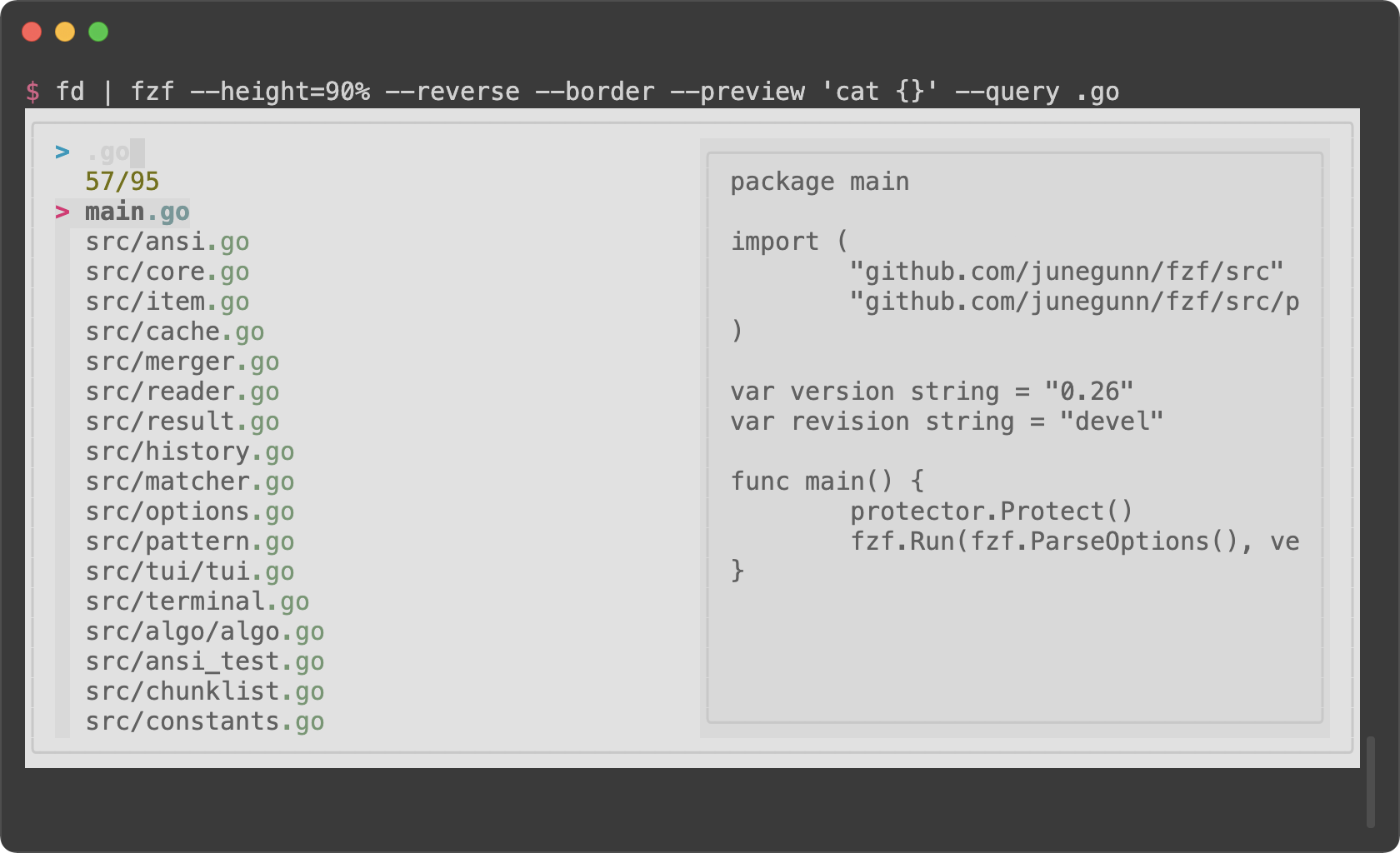
|
||||||
|
|
||||||
|
```sh
|
||||||
|
# morhetz/gruvbox
|
||||||
|
export FZF_DEFAULT_OPTS='--color=bg+:#3c3836,bg:#32302f,spinner:#fb4934,hl:#928374,fg:#ebdbb2,header:#928374,info:#8ec07c,pointer:#fb4934,marker:#fb4934,fg+:#ebdbb2,prompt:#fb4934,hl+:#fb4934'
|
||||||
|
```
|
||||||
|
|
||||||
|
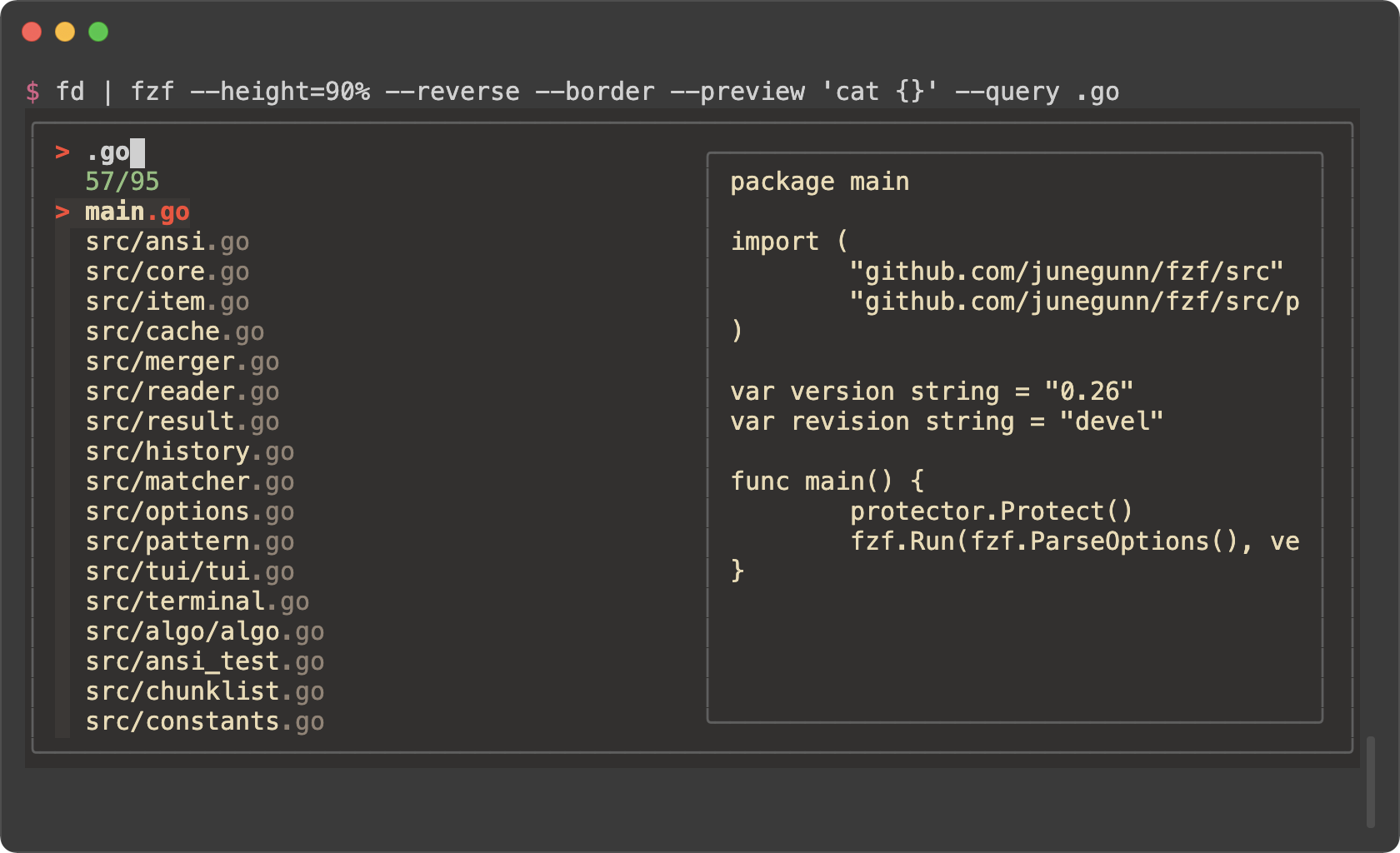
|
||||||
|
|
||||||
|
```sh
|
||||||
|
# arcticicestudio/nord-vim
|
||||||
|
export FZF_DEFAULT_OPTS='--color=bg+:#3B4252,bg:#2E3440,spinner:#81A1C1,hl:#616E88,fg:#D8DEE9,header:#616E88,info:#81A1C1,pointer:#81A1C1,marker:#81A1C1,fg+:#D8DEE9,prompt:#81A1C1,hl+:#81A1C1'
|
||||||
|
```
|
||||||
|
|
||||||
|
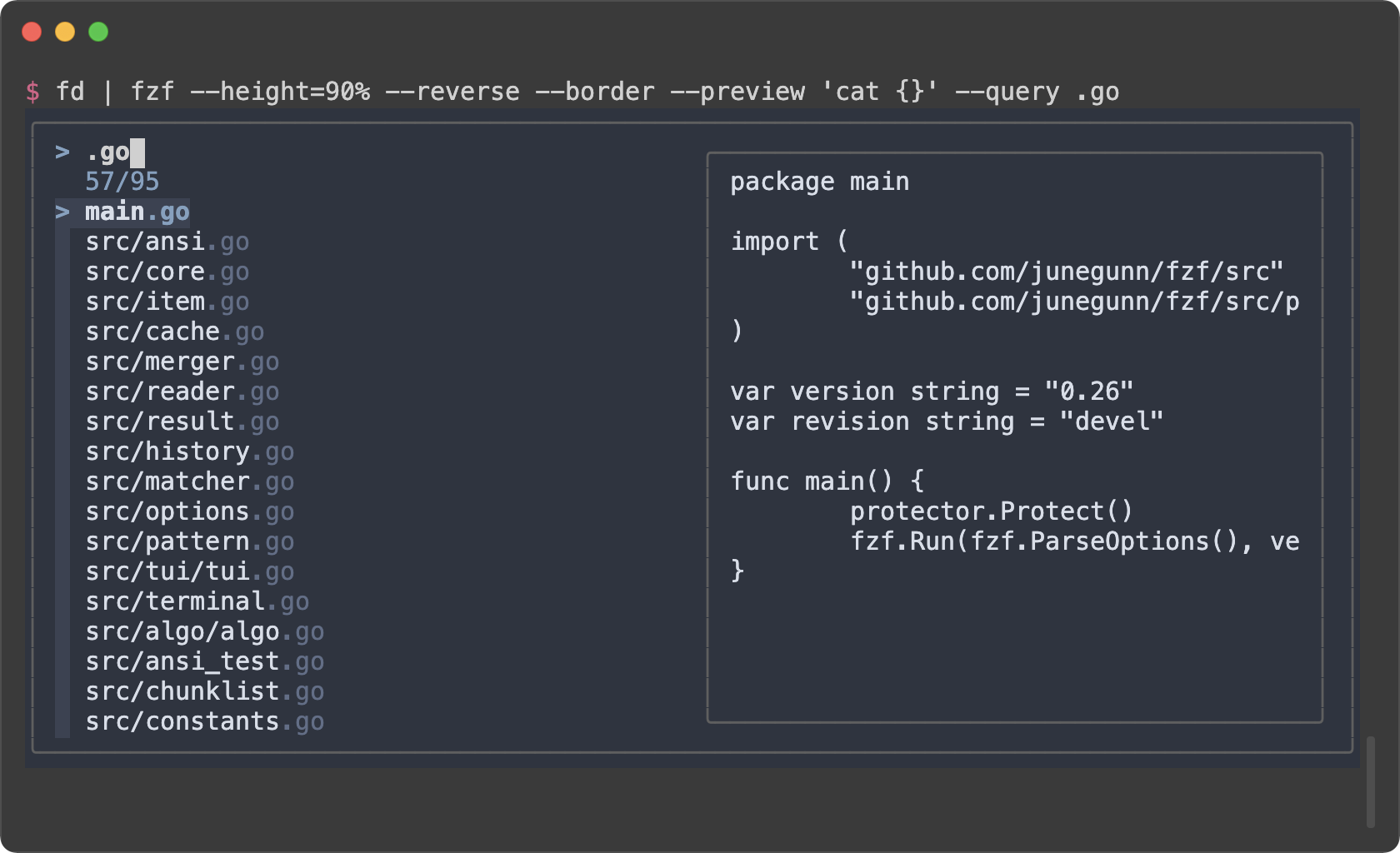
|
||||||
|
|
||||||
|
```sh
|
||||||
|
# tomasr/molokai
|
||||||
|
export FZF_DEFAULT_OPTS='--color=bg+:#293739,bg:#1B1D1E,border:#808080,spinner:#E6DB74,hl:#7E8E91,fg:#F8F8F2,header:#7E8E91,info:#A6E22E,pointer:#A6E22E,marker:#F92672,fg+:#F8F8F2,prompt:#F92672,hl+:#F92672'
|
||||||
|
```
|
||||||
|
|
||||||
|
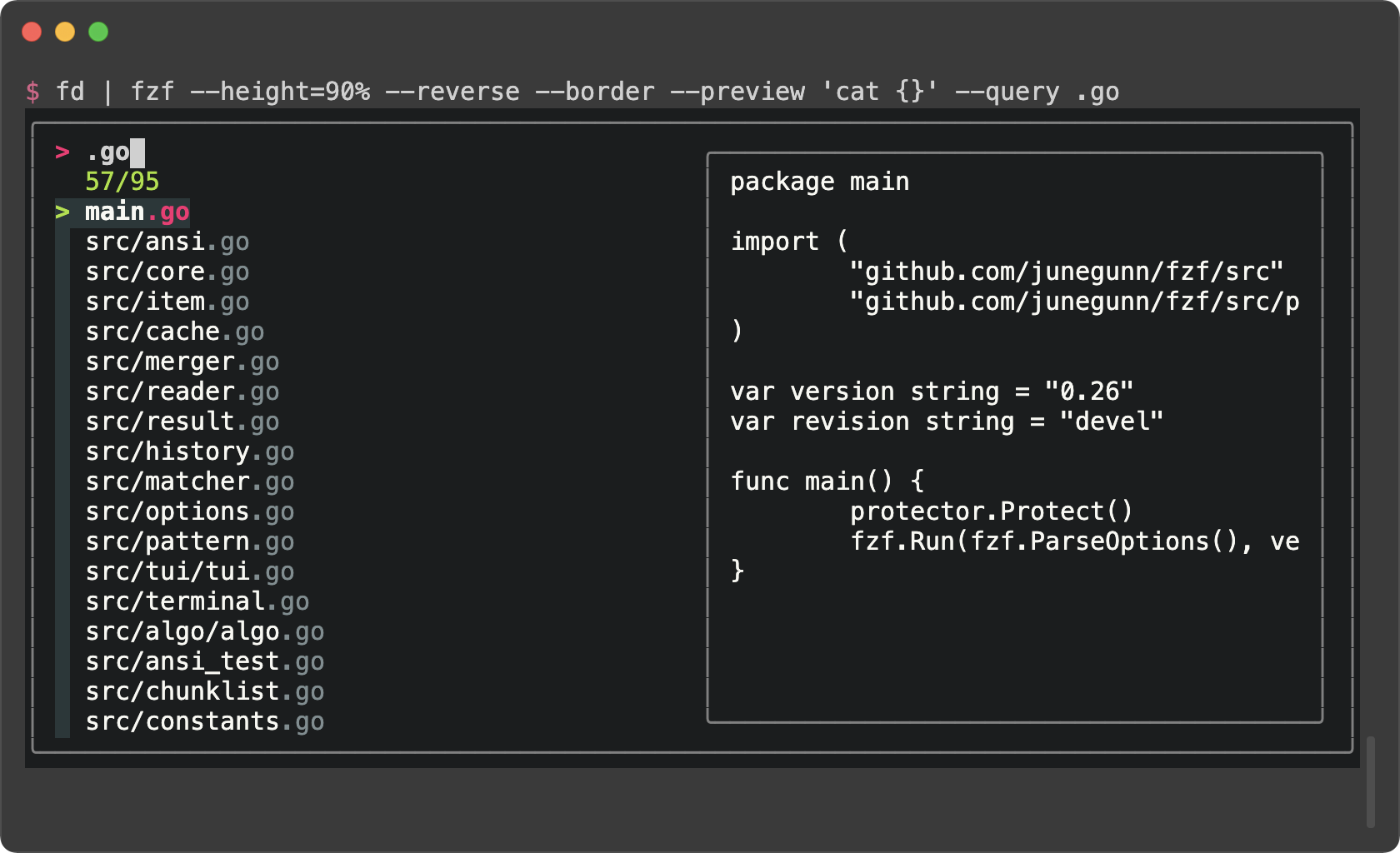
|
||||||
|
|
||||||
|
### Generating fzf color theme from Vim color schemes
|
||||||
|
|
||||||
|
The Vim plugin of fzf can generate `--color` option from the current color
|
||||||
|
scheme according to `g:fzf_colors` variable. You can find the detailed
|
||||||
|
explanation [here](https://github.com/junegunn/fzf/blob/master/README-VIM.md#explanation-of-gfzf_colors).
|
||||||
|
|
||||||
|
Here is an example. Add this to your Vim configuration file.
|
||||||
|
|
||||||
|
```vim
|
||||||
|
let g:fzf_colors =
|
||||||
|
\ { 'fg': ['fg', 'Normal'],
|
||||||
|
\ 'bg': ['bg', 'Normal'],
|
||||||
|
\ 'preview-bg': ['bg', 'NormalFloat'],
|
||||||
|
\ 'hl': ['fg', 'Comment'],
|
||||||
|
\ 'fg+': ['fg', 'CursorLine', 'CursorColumn', 'Normal'],
|
||||||
|
\ 'bg+': ['bg', 'CursorLine', 'CursorColumn'],
|
||||||
|
\ 'hl+': ['fg', 'Statement'],
|
||||||
|
\ 'info': ['fg', 'PreProc'],
|
||||||
|
\ 'border': ['fg', 'Ignore'],
|
||||||
|
\ 'prompt': ['fg', 'Conditional'],
|
||||||
|
\ 'pointer': ['fg', 'Exception'],
|
||||||
|
\ 'marker': ['fg', 'Keyword'],
|
||||||
|
\ 'spinner': ['fg', 'Label'],
|
||||||
|
\ 'header': ['fg', 'Comment'] }
|
||||||
|
```
|
||||||
|
|
||||||
|
Then you can see how the `--color` option is generated by printing the result
|
||||||
|
of `fzf#wrap()`.
|
||||||
|
|
||||||
|
```vim
|
||||||
|
:echo fzf#wrap()
|
||||||
|
```
|
||||||
|
|
||||||
|
Use this command to append `export FZF_DEFAULT_OPTS="..."` line to the end of
|
||||||
|
the current file.
|
||||||
|
|
||||||
|
```vim
|
||||||
|
:call append('$', printf('export FZF_DEFAULT_OPTS="%s"', matchstr(fzf#wrap().options, "--color[^']*")))
|
||||||
|
```
|
||||||
25
CHANGELOG.md
25
CHANGELOG.md
@@ -1,6 +1,31 @@
|
|||||||
CHANGELOG
|
CHANGELOG
|
||||||
=========
|
=========
|
||||||
|
|
||||||
|
0.27.2
|
||||||
|
------
|
||||||
|
- 16 base ANSI colors can be specified by their names
|
||||||
|
```sh
|
||||||
|
fzf --color fg:3,fg+:11
|
||||||
|
fzf --color fg:yellow,fg+:bright-yellow
|
||||||
|
```
|
||||||
|
- Fix bug where `--read0` not properly displaying long lines
|
||||||
|
|
||||||
|
0.27.1
|
||||||
|
------
|
||||||
|
- Added `unbind` action. In the following Ripgrep launcher example, you can
|
||||||
|
use `unbind(reload)` to switch to fzf-only filtering mode.
|
||||||
|
- See https://github.com/junegunn/fzf/blob/master/ADVANCED.md#switching-to-fzf-only-search-mode
|
||||||
|
- Vim plugin
|
||||||
|
- Vim plugin will stop immediately even when the source command hasn't finished
|
||||||
|
```vim
|
||||||
|
" fzf will read the stream file while allowing other processes to append to it
|
||||||
|
call fzf#run({'source': 'cat /dev/null > /tmp/stream; tail -f /tmp/stream'})
|
||||||
|
```
|
||||||
|
- It is now possible to open popup window relative to the currrent window
|
||||||
|
```vim
|
||||||
|
let g:fzf_layout = { 'window': { 'width': 0.9, 'height': 0.6, 'relative': v:true, 'yoffset': 1.0 } }
|
||||||
|
```
|
||||||
|
|
||||||
0.27.0
|
0.27.0
|
||||||
------
|
------
|
||||||
- More border options for `--preview-window`
|
- More border options for `--preview-window`
|
||||||
|
|||||||
@@ -127,9 +127,15 @@ let g:fzf_action = {
|
|||||||
\ 'ctrl-v': 'vsplit' }
|
\ 'ctrl-v': 'vsplit' }
|
||||||
|
|
||||||
" Default fzf layout
|
" Default fzf layout
|
||||||
" - Popup window
|
" - Popup window (center of the screen)
|
||||||
let g:fzf_layout = { 'window': { 'width': 0.9, 'height': 0.6 } }
|
let g:fzf_layout = { 'window': { 'width': 0.9, 'height': 0.6 } }
|
||||||
|
|
||||||
|
" - Popup window (center of the current window)
|
||||||
|
let g:fzf_layout = { 'window': { 'width': 0.9, 'height': 0.6, 'relative': v:true } }
|
||||||
|
|
||||||
|
" - Popup window (anchored to the bottom of the current window)
|
||||||
|
let g:fzf_layout = { 'window': { 'width': 0.9, 'height': 0.6, 'relative': v:true, 'yoffset': 1.0 } }
|
||||||
|
|
||||||
" - down / up / left / right
|
" - down / up / left / right
|
||||||
let g:fzf_layout = { 'down': '40%' }
|
let g:fzf_layout = { 'down': '40%' }
|
||||||
|
|
||||||
@@ -302,6 +308,7 @@ following options are allowed:
|
|||||||
- Optional:
|
- Optional:
|
||||||
- `yoffset` [float default 0.5 range [0 ~ 1]]
|
- `yoffset` [float default 0.5 range [0 ~ 1]]
|
||||||
- `xoffset` [float default 0.5 range [0 ~ 1]]
|
- `xoffset` [float default 0.5 range [0 ~ 1]]
|
||||||
|
- `relative` [boolean default v:false]
|
||||||
- `border` [string default `rounded`]: Border style
|
- `border` [string default `rounded`]: Border style
|
||||||
- `rounded` / `sharp` / `horizontal` / `vertical` / `top` / `bottom` / `left` / `right` / `no[ne]`
|
- `rounded` / `sharp` / `horizontal` / `vertical` / `top` / `bottom` / `left` / `right` / `no[ne]`
|
||||||
|
|
||||||
@@ -392,15 +399,41 @@ Tips
|
|||||||
|
|
||||||
### fzf inside terminal buffer
|
### fzf inside terminal buffer
|
||||||
|
|
||||||
The latest versions of Vim and Neovim include builtin terminal emulator
|
On the latest versions of Vim and Neovim, fzf will start in a terminal buffer.
|
||||||
(`:terminal`) and fzf will start in a terminal buffer in the following cases:
|
If you find the default ANSI colors to be different, consider configuring the
|
||||||
|
colors using `g:terminal_ansi_colors` in regular Vim or `g:terminal_color_x`
|
||||||
|
in Neovim.
|
||||||
|
|
||||||
- On Neovim
|
```vim
|
||||||
- On GVim
|
" Terminal colors for seoul256 color scheme
|
||||||
- On Terminal Vim with a non-default layout
|
if has('nvim')
|
||||||
- `call fzf#run({'left': '30%'})` or `let g:fzf_layout = {'left': '30%'}`
|
let g:terminal_color_0 = '#4e4e4e'
|
||||||
|
let g:terminal_color_1 = '#d68787'
|
||||||
|
let g:terminal_color_2 = '#5f865f'
|
||||||
|
let g:terminal_color_3 = '#d8af5f'
|
||||||
|
let g:terminal_color_4 = '#85add4'
|
||||||
|
let g:terminal_color_5 = '#d7afaf'
|
||||||
|
let g:terminal_color_6 = '#87afaf'
|
||||||
|
let g:terminal_color_7 = '#d0d0d0'
|
||||||
|
let g:terminal_color_8 = '#626262'
|
||||||
|
let g:terminal_color_9 = '#d75f87'
|
||||||
|
let g:terminal_color_10 = '#87af87'
|
||||||
|
let g:terminal_color_11 = '#ffd787'
|
||||||
|
let g:terminal_color_12 = '#add4fb'
|
||||||
|
let g:terminal_color_13 = '#ffafaf'
|
||||||
|
let g:terminal_color_14 = '#87d7d7'
|
||||||
|
let g:terminal_color_15 = '#e4e4e4'
|
||||||
|
else
|
||||||
|
let g:terminal_ansi_colors = [
|
||||||
|
\ '#4e4e4e', '#d68787', '#5f865f', '#d8af5f',
|
||||||
|
\ '#85add4', '#d7afaf', '#87afaf', '#d0d0d0',
|
||||||
|
\ '#626262', '#d75f87', '#87af87', '#ffd787',
|
||||||
|
\ '#add4fb', '#ffafaf', '#87d7d7', '#e4e4e4'
|
||||||
|
\ ]
|
||||||
|
endif
|
||||||
|
```
|
||||||
|
|
||||||
#### Starting fzf in a popup window
|
### Starting fzf in a popup window
|
||||||
|
|
||||||
```vim
|
```vim
|
||||||
" Required:
|
" Required:
|
||||||
@@ -410,6 +443,7 @@ The latest versions of Vim and Neovim include builtin terminal emulator
|
|||||||
" Optional:
|
" Optional:
|
||||||
" - xoffset [float default 0.5 range [0 ~ 1]]
|
" - xoffset [float default 0.5 range [0 ~ 1]]
|
||||||
" - yoffset [float default 0.5 range [0 ~ 1]]
|
" - yoffset [float default 0.5 range [0 ~ 1]]
|
||||||
|
" - relative [boolean default v:false]
|
||||||
" - border [string default 'rounded']: Border style
|
" - border [string default 'rounded']: Border style
|
||||||
" - 'rounded' / 'sharp' / 'horizontal' / 'vertical' / 'top' / 'bottom' / 'left' / 'right'
|
" - 'rounded' / 'sharp' / 'horizontal' / 'vertical' / 'top' / 'bottom' / 'left' / 'right'
|
||||||
let g:fzf_layout = { 'window': { 'width': 0.9, 'height': 0.6 } }
|
let g:fzf_layout = { 'window': { 'width': 0.9, 'height': 0.6 } }
|
||||||
@@ -427,21 +461,21 @@ else
|
|||||||
endif
|
endif
|
||||||
```
|
```
|
||||||
|
|
||||||
#### Hide statusline
|
### Hide statusline
|
||||||
|
|
||||||
When fzf starts in a terminal buffer, the file type of the buffer is set to
|
When fzf starts in a terminal buffer, the file type of the buffer is set to
|
||||||
`fzf`. So you can set up `FileType fzf` autocmd to customize the settings of
|
`fzf`. So you can set up `FileType fzf` autocmd to customize the settings of
|
||||||
the window.
|
the window.
|
||||||
|
|
||||||
For example, if you use a non-popup layout (e.g. `{'down': '40%'}`) on Neovim,
|
For example, if you open fzf on the bottom on the screen (e.g. `{'down':
|
||||||
you might want to temporarily disable the statusline for a cleaner look.
|
'40%'}`), you might want to temporarily disable the statusline for a cleaner
|
||||||
|
look.
|
||||||
|
|
||||||
```vim
|
```vim
|
||||||
if has('nvim') && !exists('g:fzf_layout')
|
let g:fzf_layout = { 'down': '30%' }
|
||||||
autocmd! FileType fzf
|
autocmd! FileType fzf
|
||||||
autocmd FileType fzf set laststatus=0 noshowmode noruler
|
autocmd FileType fzf set laststatus=0 noshowmode noruler
|
||||||
\| autocmd BufLeave <buffer> set laststatus=2 showmode ruler
|
\| autocmd BufLeave <buffer> set laststatus=2 showmode ruler
|
||||||
endif
|
|
||||||
```
|
```
|
||||||
|
|
||||||
[License](LICENSE)
|
[License](LICENSE)
|
||||||
|
|||||||
@@ -121,6 +121,7 @@ git clone --depth 1 https://github.com/junegunn/fzf.git ~/.fzf
|
|||||||
| Nix | NixOS, etc. | `nix-env -iA nixpkgs.fzf` |
|
| Nix | NixOS, etc. | `nix-env -iA nixpkgs.fzf` |
|
||||||
| Pacman | Arch Linux | `sudo pacman -S fzf` |
|
| Pacman | Arch Linux | `sudo pacman -S fzf` |
|
||||||
| pkg | FreeBSD | `pkg install fzf` |
|
| pkg | FreeBSD | `pkg install fzf` |
|
||||||
|
| pkgin | NetBSD | `pkgin install fzf` |
|
||||||
| pkg_add | OpenBSD | `pkg_add fzf` |
|
| pkg_add | OpenBSD | `pkg_add fzf` |
|
||||||
| XBPS | Void Linux | `sudo xbps-install -S fzf` |
|
| XBPS | Void Linux | `sudo xbps-install -S fzf` |
|
||||||
| Zypper | openSUSE | `sudo zypper install fzf` |
|
| Zypper | openSUSE | `sudo zypper install fzf` |
|
||||||
@@ -289,9 +290,10 @@ If you learn by watching videos, check out this screencast by [@samoshkin](https
|
|||||||
Examples
|
Examples
|
||||||
--------
|
--------
|
||||||
|
|
||||||
Many useful examples can be found on [the wiki
|
* [Wiki page of examples](https://github.com/junegunn/fzf/wiki/examples)
|
||||||
page](https://github.com/junegunn/fzf/wiki/examples). Feel free to add your
|
* *Disclaimer: The examples on this page are maintained by the community
|
||||||
own as well.
|
and are not thoroughly tested*
|
||||||
|
* [Advanced fzf examples](https://github.com/junegunn/fzf/blob/master/ADVANCED.md)
|
||||||
|
|
||||||
`fzf-tmux` script
|
`fzf-tmux` script
|
||||||
-----------------
|
-----------------
|
||||||
|
|||||||
76
doc/fzf.txt
76
doc/fzf.txt
@@ -1,4 +1,4 @@
|
|||||||
fzf.txt fzf Last change: January 3 2021
|
fzf.txt fzf Last change: May 19 2021
|
||||||
FZF - TABLE OF CONTENTS *fzf* *fzf-toc*
|
FZF - TABLE OF CONTENTS *fzf* *fzf-toc*
|
||||||
==============================================================================
|
==============================================================================
|
||||||
|
|
||||||
@@ -14,8 +14,8 @@ FZF - TABLE OF CONTENTS *fzf* *fzf-to
|
|||||||
Global options supported by fzf#wrap |fzf-global-options-supported-by-fzf#wrap|
|
Global options supported by fzf#wrap |fzf-global-options-supported-by-fzf#wrap|
|
||||||
Tips |fzf-tips|
|
Tips |fzf-tips|
|
||||||
fzf inside terminal buffer |fzf-inside-terminal-buffer|
|
fzf inside terminal buffer |fzf-inside-terminal-buffer|
|
||||||
Starting fzf in a popup window |fzf-starting-fzf-in-a-popup-window|
|
Starting fzf in a popup window |fzf-starting-fzf-in-a-popup-window|
|
||||||
Hide statusline |fzf-hide-statusline|
|
Hide statusline |fzf-hide-statusline|
|
||||||
License |fzf-license|
|
License |fzf-license|
|
||||||
|
|
||||||
FZF VIM INTEGRATION *fzf-vim-integration*
|
FZF VIM INTEGRATION *fzf-vim-integration*
|
||||||
@@ -155,9 +155,15 @@ Examples~
|
|||||||
\ 'ctrl-v': 'vsplit' }
|
\ 'ctrl-v': 'vsplit' }
|
||||||
|
|
||||||
" Default fzf layout
|
" Default fzf layout
|
||||||
" - Popup window
|
" - Popup window (center of the screen)
|
||||||
let g:fzf_layout = { 'window': { 'width': 0.9, 'height': 0.6 } }
|
let g:fzf_layout = { 'window': { 'width': 0.9, 'height': 0.6 } }
|
||||||
|
|
||||||
|
" - Popup window (center of the current window)
|
||||||
|
let g:fzf_layout = { 'window': { 'width': 0.9, 'height': 0.6, 'relative': v:true } }
|
||||||
|
|
||||||
|
" - Popup window (anchored to the bottom of the current window)
|
||||||
|
let g:fzf_layout = { 'window': { 'width': 0.9, 'height': 0.6, 'relative': v:true, 'yoffset': 1.0 } }
|
||||||
|
|
||||||
" - down / up / left / right
|
" - down / up / left / right
|
||||||
let g:fzf_layout = { 'down': '40%' }
|
let g:fzf_layout = { 'down': '40%' }
|
||||||
|
|
||||||
@@ -318,6 +324,7 @@ following options are allowed:
|
|||||||
- Optional:
|
- Optional:
|
||||||
- `yoffset` [float default 0.5 range [0 ~ 1]]
|
- `yoffset` [float default 0.5 range [0 ~ 1]]
|
||||||
- `xoffset` [float default 0.5 range [0 ~ 1]]
|
- `xoffset` [float default 0.5 range [0 ~ 1]]
|
||||||
|
- `relative` [boolean default v:false]
|
||||||
- `border` [string default `rounded`]: Border style
|
- `border` [string default `rounded`]: Border style
|
||||||
- `rounded` / `sharp` / `horizontal` / `vertical` / `top` / `bottom` / `left` / `right` / `no[ne]`
|
- `rounded` / `sharp` / `horizontal` / `vertical` / `top` / `bottom` / `left` / `right` / `no[ne]`
|
||||||
|
|
||||||
@@ -372,7 +379,7 @@ last `fullscreen` argument of `fzf#wrap` (see :help <bang>).
|
|||||||
Our `:LS` command will be much more useful if we can pass a directory argument
|
Our `:LS` command will be much more useful if we can pass a directory argument
|
||||||
to it, so that something like `:LS /tmp` is possible.
|
to it, so that something like `:LS /tmp` is possible.
|
||||||
>
|
>
|
||||||
command! -bang -complete=dir -nargs=* LS
|
command! -bang -complete=dir -nargs=? LS
|
||||||
\ call fzf#run(fzf#wrap({'source': 'ls', 'dir': <q-args>}, <bang>0))
|
\ call fzf#run(fzf#wrap({'source': 'ls', 'dir': <q-args>}, <bang>0))
|
||||||
<
|
<
|
||||||
Lastly, if you have enabled `g:fzf_history_dir`, you might want to assign a
|
Lastly, if you have enabled `g:fzf_history_dir`, you might want to assign a
|
||||||
@@ -380,7 +387,7 @@ unique name to our command and pass it as the first argument to `fzf#wrap`.
|
|||||||
>
|
>
|
||||||
" The query history for this command will be stored as 'ls' inside g:fzf_history_dir.
|
" The query history for this command will be stored as 'ls' inside g:fzf_history_dir.
|
||||||
" The name is ignored if g:fzf_history_dir is not defined.
|
" The name is ignored if g:fzf_history_dir is not defined.
|
||||||
command! -bang -complete=dir -nargs=* LS
|
command! -bang -complete=dir -nargs=? LS
|
||||||
\ call fzf#run(fzf#wrap('ls', {'source': 'ls', 'dir': <q-args>}, <bang>0))
|
\ call fzf#run(fzf#wrap('ls', {'source': 'ls', 'dir': <q-args>}, <bang>0))
|
||||||
<
|
<
|
||||||
|
|
||||||
@@ -412,8 +419,46 @@ The latest versions of Vim and Neovim include builtin terminal emulator
|
|||||||
- On Terminal Vim with a non-default layout
|
- On Terminal Vim with a non-default layout
|
||||||
- `call fzf#run({'left': '30%'})` or `let g:fzf_layout = {'left': '30%'}`
|
- `call fzf#run({'left': '30%'})` or `let g:fzf_layout = {'left': '30%'}`
|
||||||
|
|
||||||
|
On the latest versions of Vim and Neovim, fzf will start in a terminal buffer.
|
||||||
|
If you find the default ANSI colors to be different, consider configuring the
|
||||||
|
colors using `g:terminal_ansi_colors` in regular Vim or `g:terminal_color_x`
|
||||||
|
in Neovim.
|
||||||
|
|
||||||
Starting fzf in a popup window~
|
*g:terminal_color_15* *g:terminal_color_14* *g:terminal_color_13*
|
||||||
|
*g:terminal_color_12* *g:terminal_color_11* *g:terminal_color_10* *g:terminal_color_9*
|
||||||
|
*g:terminal_color_8* *g:terminal_color_7* *g:terminal_color_6* *g:terminal_color_5*
|
||||||
|
*g:terminal_color_4* *g:terminal_color_3* *g:terminal_color_2* *g:terminal_color_1*
|
||||||
|
*g:terminal_color_0*
|
||||||
|
>
|
||||||
|
" Terminal colors for seoul256 color scheme
|
||||||
|
if has('nvim')
|
||||||
|
let g:terminal_color_0 = '#4e4e4e'
|
||||||
|
let g:terminal_color_1 = '#d68787'
|
||||||
|
let g:terminal_color_2 = '#5f865f'
|
||||||
|
let g:terminal_color_3 = '#d8af5f'
|
||||||
|
let g:terminal_color_4 = '#85add4'
|
||||||
|
let g:terminal_color_5 = '#d7afaf'
|
||||||
|
let g:terminal_color_6 = '#87afaf'
|
||||||
|
let g:terminal_color_7 = '#d0d0d0'
|
||||||
|
let g:terminal_color_8 = '#626262'
|
||||||
|
let g:terminal_color_9 = '#d75f87'
|
||||||
|
let g:terminal_color_10 = '#87af87'
|
||||||
|
let g:terminal_color_11 = '#ffd787'
|
||||||
|
let g:terminal_color_12 = '#add4fb'
|
||||||
|
let g:terminal_color_13 = '#ffafaf'
|
||||||
|
let g:terminal_color_14 = '#87d7d7'
|
||||||
|
let g:terminal_color_15 = '#e4e4e4'
|
||||||
|
else
|
||||||
|
let g:terminal_ansi_colors = [
|
||||||
|
\ '#4e4e4e', '#d68787', '#5f865f', '#d8af5f',
|
||||||
|
\ '#85add4', '#d7afaf', '#87afaf', '#d0d0d0',
|
||||||
|
\ '#626262', '#d75f87', '#87af87', '#ffd787',
|
||||||
|
\ '#add4fb', '#ffafaf', '#87d7d7', '#e4e4e4'
|
||||||
|
\ ]
|
||||||
|
endif
|
||||||
|
<
|
||||||
|
|
||||||
|
< Starting fzf in a popup window >____________________________________________~
|
||||||
*fzf-starting-fzf-in-a-popup-window*
|
*fzf-starting-fzf-in-a-popup-window*
|
||||||
>
|
>
|
||||||
" Required:
|
" Required:
|
||||||
@@ -423,6 +468,7 @@ Starting fzf in a popup window~
|
|||||||
" Optional:
|
" Optional:
|
||||||
" - xoffset [float default 0.5 range [0 ~ 1]]
|
" - xoffset [float default 0.5 range [0 ~ 1]]
|
||||||
" - yoffset [float default 0.5 range [0 ~ 1]]
|
" - yoffset [float default 0.5 range [0 ~ 1]]
|
||||||
|
" - relative [boolean default v:false]
|
||||||
" - border [string default 'rounded']: Border style
|
" - border [string default 'rounded']: Border style
|
||||||
" - 'rounded' / 'sharp' / 'horizontal' / 'vertical' / 'top' / 'bottom' / 'left' / 'right'
|
" - 'rounded' / 'sharp' / 'horizontal' / 'vertical' / 'top' / 'bottom' / 'left' / 'right'
|
||||||
let g:fzf_layout = { 'window': { 'width': 0.9, 'height': 0.6 } }
|
let g:fzf_layout = { 'window': { 'width': 0.9, 'height': 0.6 } }
|
||||||
@@ -438,21 +484,21 @@ or above) by putting fzf-tmux options in `tmux` key.
|
|||||||
endif
|
endif
|
||||||
<
|
<
|
||||||
|
|
||||||
Hide statusline~
|
< Hide statusline >___________________________________________________________~
|
||||||
*fzf-hide-statusline*
|
*fzf-hide-statusline*
|
||||||
|
|
||||||
When fzf starts in a terminal buffer, the file type of the buffer is set to
|
When fzf starts in a terminal buffer, the file type of the buffer is set to
|
||||||
`fzf`. So you can set up `FileType fzf` autocmd to customize the settings of
|
`fzf`. So you can set up `FileType fzf` autocmd to customize the settings of
|
||||||
the window.
|
the window.
|
||||||
|
|
||||||
For example, if you use a non-popup layout (e.g. `{'down': '40%'}`) on Neovim,
|
For example, if you open fzf on the bottom on the screen (e.g. `{'down':
|
||||||
you might want to temporarily disable the statusline for a cleaner look.
|
'40%'}`), you might want to temporarily disable the statusline for a cleaner
|
||||||
|
look.
|
||||||
>
|
>
|
||||||
if has('nvim') && !exists('g:fzf_layout')
|
let g:fzf_layout = { 'down': '30%' }
|
||||||
autocmd! FileType fzf
|
autocmd! FileType fzf
|
||||||
autocmd FileType fzf set laststatus=0 noshowmode noruler
|
autocmd FileType fzf set laststatus=0 noshowmode noruler
|
||||||
\| autocmd BufLeave <buffer> set laststatus=2 showmode ruler
|
\| autocmd BufLeave <buffer> set laststatus=2 showmode ruler
|
||||||
endif
|
|
||||||
<
|
<
|
||||||
|
|
||||||
LICENSE *fzf-license*
|
LICENSE *fzf-license*
|
||||||
|
|||||||
2
go.mod
2
go.mod
@@ -6,7 +6,7 @@ require (
|
|||||||
github.com/mattn/go-isatty v0.0.12
|
github.com/mattn/go-isatty v0.0.12
|
||||||
github.com/mattn/go-runewidth v0.0.12
|
github.com/mattn/go-runewidth v0.0.12
|
||||||
github.com/mattn/go-shellwords v1.0.11
|
github.com/mattn/go-shellwords v1.0.11
|
||||||
github.com/rivo/uniseg v0.2.0 // indirect
|
github.com/rivo/uniseg v0.2.0
|
||||||
github.com/saracen/walker v0.1.2
|
github.com/saracen/walker v0.1.2
|
||||||
golang.org/x/sync v0.0.0-20210220032951-036812b2e83c // indirect
|
golang.org/x/sync v0.0.0-20210220032951-036812b2e83c // indirect
|
||||||
golang.org/x/sys v0.0.0-20210403161142-5e06dd20ab57
|
golang.org/x/sys v0.0.0-20210403161142-5e06dd20ab57
|
||||||
|
|||||||
2
install
2
install
@@ -2,7 +2,7 @@
|
|||||||
|
|
||||||
set -u
|
set -u
|
||||||
|
|
||||||
version=0.27.0
|
version=0.27.2
|
||||||
auto_completion=
|
auto_completion=
|
||||||
key_bindings=
|
key_bindings=
|
||||||
update_config=2
|
update_config=2
|
||||||
|
|||||||
@@ -1,4 +1,4 @@
|
|||||||
$version="0.27.0"
|
$version="0.27.2"
|
||||||
|
|
||||||
$fzf_base=Split-Path -Parent $MyInvocation.MyCommand.Definition
|
$fzf_base=Split-Path -Parent $MyInvocation.MyCommand.Definition
|
||||||
|
|
||||||
|
|||||||
@@ -21,7 +21,7 @@ LIABILITY, WHETHER IN AN ACTION OF CONTRACT, TORT OR OTHERWISE, ARISING FROM,
|
|||||||
OUT OF OR IN CONNECTION WITH THE SOFTWARE OR THE USE OR OTHER DEALINGS IN
|
OUT OF OR IN CONNECTION WITH THE SOFTWARE OR THE USE OR OTHER DEALINGS IN
|
||||||
THE SOFTWARE.
|
THE SOFTWARE.
|
||||||
..
|
..
|
||||||
.TH fzf-tmux 1 "Apr 2021" "fzf 0.27.0" "fzf-tmux - open fzf in tmux split pane"
|
.TH fzf-tmux 1 "Jun 2021" "fzf 0.27.2" "fzf-tmux - open fzf in tmux split pane"
|
||||||
|
|
||||||
.SH NAME
|
.SH NAME
|
||||||
fzf-tmux - open fzf in tmux split pane
|
fzf-tmux - open fzf in tmux split pane
|
||||||
|
|||||||
@@ -21,7 +21,7 @@ LIABILITY, WHETHER IN AN ACTION OF CONTRACT, TORT OR OTHERWISE, ARISING FROM,
|
|||||||
OUT OF OR IN CONNECTION WITH THE SOFTWARE OR THE USE OR OTHER DEALINGS IN
|
OUT OF OR IN CONNECTION WITH THE SOFTWARE OR THE USE OR OTHER DEALINGS IN
|
||||||
THE SOFTWARE.
|
THE SOFTWARE.
|
||||||
..
|
..
|
||||||
.TH fzf 1 "Apr 2021" "fzf 0.27.0" "fzf - a command-line fuzzy finder"
|
.TH fzf 1 "Jun 2021" "fzf 0.27.2" "fzf - a command-line fuzzy finder"
|
||||||
|
|
||||||
.SH NAME
|
.SH NAME
|
||||||
fzf - a command-line fuzzy finder
|
fzf - a command-line fuzzy finder
|
||||||
@@ -340,6 +340,22 @@ color mappings.
|
|||||||
\fB-1 \fRDefault terminal foreground/background color
|
\fB-1 \fRDefault terminal foreground/background color
|
||||||
\fB \fR(or the original color of the text)
|
\fB \fR(or the original color of the text)
|
||||||
\fB0 ~ 15 \fR16 base colors
|
\fB0 ~ 15 \fR16 base colors
|
||||||
|
\fBblack\fR
|
||||||
|
\fBred\fR
|
||||||
|
\fBgreen\fR
|
||||||
|
\fByellow\fR
|
||||||
|
\fBblue\fR
|
||||||
|
\fBmagenta\fR
|
||||||
|
\fBcyan\fR
|
||||||
|
\fBwhite\fR
|
||||||
|
\fBbright-black\fR (gray | grey)
|
||||||
|
\fBbright-red\fR
|
||||||
|
\fBbright-green\fR
|
||||||
|
\fBbright-yellow\fR
|
||||||
|
\fBbright-blue\fR
|
||||||
|
\fBbright-magenta\fR
|
||||||
|
\fBbright-cyan\fR
|
||||||
|
\fBbright-white\fR
|
||||||
\fB16 ~ 255 \fRANSI 256 colors
|
\fB16 ~ 255 \fRANSI 256 colors
|
||||||
\fB#rrggbb \fR24-bit colors
|
\fB#rrggbb \fR24-bit colors
|
||||||
|
|
||||||
@@ -532,10 +548,12 @@ e.g.
|
|||||||
Start the finder with the given query
|
Start the finder with the given query
|
||||||
.TP
|
.TP
|
||||||
.B "-1, --select-1"
|
.B "-1, --select-1"
|
||||||
Automatically select the only match
|
If there is only one match for the initial query (\fB--query\fR), do not start
|
||||||
|
interactive finder and automatically select the only match
|
||||||
.TP
|
.TP
|
||||||
.B "-0, --exit-0"
|
.B "-0, --exit-0"
|
||||||
Exit immediately when there's no match
|
If there is no match for the initial query (\fB--query\fR), do not start
|
||||||
|
interactive finder and exit immediately
|
||||||
.TP
|
.TP
|
||||||
.BI "-f, --filter=" "STR"
|
.BI "-f, --filter=" "STR"
|
||||||
Filter mode. Do not start interactive finder. When used with \fB--no-sort\fR,
|
Filter mode. Do not start interactive finder. When used with \fB--no-sort\fR,
|
||||||
@@ -850,6 +868,7 @@ A key or an event can be bound to one or more of the following actions.
|
|||||||
\fBtoggle-search\fR (toggle search functionality)
|
\fBtoggle-search\fR (toggle search functionality)
|
||||||
\fBtoggle-sort\fR
|
\fBtoggle-sort\fR
|
||||||
\fBtoggle+up\fR \fIbtab (shift-tab)\fR
|
\fBtoggle+up\fR \fIbtab (shift-tab)\fR
|
||||||
|
\fBunbind(...)\fR (unbind bindings)
|
||||||
\fBunix-line-discard\fR \fIctrl-u\fR
|
\fBunix-line-discard\fR \fIctrl-u\fR
|
||||||
\fBunix-word-rubout\fR \fIctrl-w\fR
|
\fBunix-word-rubout\fR \fIctrl-w\fR
|
||||||
\fBup\fR \fIctrl-k ctrl-p up\fR
|
\fBup\fR \fIctrl-k ctrl-p up\fR
|
||||||
|
|||||||
@@ -465,19 +465,19 @@ try
|
|||||||
endif
|
endif
|
||||||
|
|
||||||
if has_key(dict, 'source')
|
if has_key(dict, 'source')
|
||||||
let source = dict.source
|
let source = remove(dict, 'source')
|
||||||
let type = type(source)
|
let type = type(source)
|
||||||
if type == 1
|
if type == 1
|
||||||
let prefix = '( '.source.' )|'
|
let source_command = source
|
||||||
elseif type == 3
|
elseif type == 3
|
||||||
let temps.input = s:fzf_tempname()
|
let temps.input = s:fzf_tempname()
|
||||||
call writefile(source, temps.input)
|
call writefile(source, temps.input)
|
||||||
let prefix = (s:is_win ? 'type ' : 'cat ').fzf#shellescape(temps.input).'|'
|
let source_command = (s:is_win ? 'type ' : 'cat ').fzf#shellescape(temps.input)
|
||||||
else
|
else
|
||||||
throw 'Invalid source type'
|
throw 'Invalid source type'
|
||||||
endif
|
endif
|
||||||
else
|
else
|
||||||
let prefix = ''
|
let source_command = ''
|
||||||
endif
|
endif
|
||||||
|
|
||||||
let prefer_tmux = get(g:, 'fzf_prefer_tmux', 0) || has_key(dict, 'tmux')
|
let prefer_tmux = get(g:, 'fzf_prefer_tmux', 0) || has_key(dict, 'tmux')
|
||||||
@@ -487,20 +487,24 @@ try
|
|||||||
let has_vim8_term = has('terminal') && has('patch-8.0.995')
|
let has_vim8_term = has('terminal') && has('patch-8.0.995')
|
||||||
let has_nvim_term = has('nvim-0.2.1') || has('nvim') && !s:is_win
|
let has_nvim_term = has('nvim-0.2.1') || has('nvim') && !s:is_win
|
||||||
let use_term = has_nvim_term ||
|
let use_term = has_nvim_term ||
|
||||||
\ has_vim8_term && !has('win32unix') && (has('gui_running') || s:is_win || !use_height && s:present(dict, 'down', 'up', 'left', 'right', 'window'))
|
\ has_vim8_term && !has('win32unix') && (has('gui_running') || s:is_win || s:present(dict, 'down', 'up', 'left', 'right', 'window'))
|
||||||
let use_tmux = (has_key(dict, 'tmux') || (!use_height && !use_term || prefer_tmux) && !has('win32unix') && s:splittable(dict)) && s:tmux_enabled()
|
let use_tmux = (has_key(dict, 'tmux') || (!use_height && !use_term || prefer_tmux) && !has('win32unix') && s:splittable(dict)) && s:tmux_enabled()
|
||||||
if prefer_tmux && use_tmux
|
if prefer_tmux && use_tmux
|
||||||
let use_height = 0
|
let use_height = 0
|
||||||
let use_term = 0
|
let use_term = 0
|
||||||
endif
|
endif
|
||||||
if use_height
|
if use_term
|
||||||
|
let optstr .= ' --no-height'
|
||||||
|
elseif use_height
|
||||||
let height = s:calc_size(&lines, dict.down, dict)
|
let height = s:calc_size(&lines, dict.down, dict)
|
||||||
let optstr .= ' --height='.height
|
let optstr .= ' --height='.height
|
||||||
elseif use_term
|
|
||||||
let optstr .= ' --no-height'
|
|
||||||
endif
|
endif
|
||||||
let optstr .= s:border_opt(get(dict, 'window', 0))
|
let optstr .= s:border_opt(get(dict, 'window', 0))
|
||||||
let command = prefix.(use_tmux ? s:fzf_tmux(dict) : fzf_exec).' '.optstr.' > '.temps.result
|
let prev_default_command = $FZF_DEFAULT_COMMAND
|
||||||
|
if len(source_command)
|
||||||
|
let $FZF_DEFAULT_COMMAND = source_command
|
||||||
|
endif
|
||||||
|
let command = (use_tmux ? s:fzf_tmux(dict) : fzf_exec).' '.optstr.' > '.temps.result
|
||||||
|
|
||||||
if use_term
|
if use_term
|
||||||
return s:execute_term(dict, command, temps)
|
return s:execute_term(dict, command, temps)
|
||||||
@@ -511,6 +515,13 @@ try
|
|||||||
call s:callback(dict, lines)
|
call s:callback(dict, lines)
|
||||||
return lines
|
return lines
|
||||||
finally
|
finally
|
||||||
|
if len(source_command)
|
||||||
|
if len(prev_default_command)
|
||||||
|
let $FZF_DEFAULT_COMMAND = prev_default_command
|
||||||
|
else
|
||||||
|
execute 'unlet $FZF_DEFAULT_COMMAND'
|
||||||
|
endif
|
||||||
|
endif
|
||||||
let [&shell, &shellslash, &shellcmdflag, &shellxquote] = [shell, shellslash, shellcmdflag, shellxquote]
|
let [&shell, &shellslash, &shellcmdflag, &shellxquote] = [shell, shellslash, shellcmdflag, shellxquote]
|
||||||
endtry
|
endtry
|
||||||
endfunction
|
endfunction
|
||||||
@@ -540,8 +551,8 @@ function! s:fzf_tmux(dict)
|
|||||||
endif
|
endif
|
||||||
endfor
|
endfor
|
||||||
endif
|
endif
|
||||||
return printf('LINES=%d COLUMNS=%d %s %s %s --',
|
return printf('LINES=%d COLUMNS=%d %s %s - --',
|
||||||
\ &lines, &columns, fzf#shellescape(s:fzf_tmux), size, (has_key(a:dict, 'source') ? '' : '-'))
|
\ &lines, &columns, fzf#shellescape(s:fzf_tmux), size)
|
||||||
endfunction
|
endfunction
|
||||||
|
|
||||||
function! s:splittable(dict)
|
function! s:splittable(dict)
|
||||||
@@ -671,8 +682,7 @@ function! s:execute(dict, command, use_height, temps) abort
|
|||||||
let a:temps.shellscript = shellscript
|
let a:temps.shellscript = shellscript
|
||||||
endif
|
endif
|
||||||
if a:use_height
|
if a:use_height
|
||||||
let stdin = has_key(a:dict, 'source') ? '' : '< /dev/tty'
|
call system(printf('tput cup %d > /dev/tty; tput cnorm > /dev/tty; %s < /dev/tty 2> /dev/tty', &lines, command))
|
||||||
call system(printf('tput cup %d > /dev/tty; tput cnorm > /dev/tty; %s %s 2> /dev/tty', &lines, command, stdin))
|
|
||||||
else
|
else
|
||||||
execute 'silent !'.command
|
execute 'silent !'.command
|
||||||
endif
|
endif
|
||||||
@@ -972,11 +982,19 @@ else
|
|||||||
endif
|
endif
|
||||||
|
|
||||||
function! s:popup(opts) abort
|
function! s:popup(opts) abort
|
||||||
|
let xoffset = get(a:opts, 'xoffset', 0.5)
|
||||||
|
let yoffset = get(a:opts, 'yoffset', 0.5)
|
||||||
|
let relative = get(a:opts, 'relative', 0)
|
||||||
|
|
||||||
|
" Use current window size for positioning relatively positioned popups
|
||||||
|
let columns = relative ? winwidth(0) : &columns
|
||||||
|
let lines = relative ? winheight(0) : (&lines - has('nvim'))
|
||||||
|
|
||||||
" Size and position
|
" Size and position
|
||||||
let width = min([max([8, a:opts.width > 1 ? a:opts.width : float2nr(&columns * a:opts.width)]), &columns])
|
let width = min([max([8, a:opts.width > 1 ? a:opts.width : float2nr(columns * a:opts.width)]), columns])
|
||||||
let height = min([max([4, a:opts.height > 1 ? a:opts.height : float2nr(&lines * a:opts.height)]), &lines - has('nvim')])
|
let height = min([max([4, a:opts.height > 1 ? a:opts.height : float2nr(lines * a:opts.height)]), lines])
|
||||||
let row = float2nr(get(a:opts, 'yoffset', 0.5) * (&lines - height))
|
let row = float2nr(yoffset * (lines - height)) + (relative ? win_screenpos(0)[0] - 1 : 0)
|
||||||
let col = float2nr(get(a:opts, 'xoffset', 0.5) * (&columns - width))
|
let col = float2nr(xoffset * (columns - width)) + (relative ? win_screenpos(0)[1] - 1 : 0)
|
||||||
|
|
||||||
" Managing the differences
|
" Managing the differences
|
||||||
let row = min([max([0, row]), &lines - has('nvim') - height])
|
let row = min([max([0, row]), &lines - has('nvim') - height])
|
||||||
|
|||||||
@@ -670,6 +670,38 @@ func parseTheme(defaultTheme *tui.ColorTheme, str string) *tui.ColorTheme {
|
|||||||
cattr.Attr |= tui.Blink
|
cattr.Attr |= tui.Blink
|
||||||
case "reverse":
|
case "reverse":
|
||||||
cattr.Attr |= tui.Reverse
|
cattr.Attr |= tui.Reverse
|
||||||
|
case "black":
|
||||||
|
cattr.Color = tui.Color(0)
|
||||||
|
case "red":
|
||||||
|
cattr.Color = tui.Color(1)
|
||||||
|
case "green":
|
||||||
|
cattr.Color = tui.Color(2)
|
||||||
|
case "yellow":
|
||||||
|
cattr.Color = tui.Color(3)
|
||||||
|
case "blue":
|
||||||
|
cattr.Color = tui.Color(4)
|
||||||
|
case "magenta":
|
||||||
|
cattr.Color = tui.Color(5)
|
||||||
|
case "cyan":
|
||||||
|
cattr.Color = tui.Color(6)
|
||||||
|
case "white":
|
||||||
|
cattr.Color = tui.Color(7)
|
||||||
|
case "bright-black", "gray", "grey":
|
||||||
|
cattr.Color = tui.Color(8)
|
||||||
|
case "bright-red":
|
||||||
|
cattr.Color = tui.Color(9)
|
||||||
|
case "bright-green":
|
||||||
|
cattr.Color = tui.Color(10)
|
||||||
|
case "bright-yellow":
|
||||||
|
cattr.Color = tui.Color(11)
|
||||||
|
case "bright-blue":
|
||||||
|
cattr.Color = tui.Color(12)
|
||||||
|
case "bright-magenta":
|
||||||
|
cattr.Color = tui.Color(13)
|
||||||
|
case "bright-cyan":
|
||||||
|
cattr.Color = tui.Color(14)
|
||||||
|
case "bright-white":
|
||||||
|
cattr.Color = tui.Color(15)
|
||||||
case "":
|
case "":
|
||||||
default:
|
default:
|
||||||
if rrggbb.MatchString(component) {
|
if rrggbb.MatchString(component) {
|
||||||
@@ -748,7 +780,7 @@ func init() {
|
|||||||
// Backreferences are not supported.
|
// Backreferences are not supported.
|
||||||
// "~!@#$%^&*;/|".each_char.map { |c| Regexp.escape(c) }.map { |c| "#{c}[^#{c}]*#{c}" }.join('|')
|
// "~!@#$%^&*;/|".each_char.map { |c| Regexp.escape(c) }.map { |c| "#{c}[^#{c}]*#{c}" }.join('|')
|
||||||
executeRegexp = regexp.MustCompile(
|
executeRegexp = regexp.MustCompile(
|
||||||
`(?si)[:+](execute(?:-multi|-silent)?|reload|preview|change-prompt):.+|[:+](execute(?:-multi|-silent)?|reload|preview|change-prompt)(\([^)]*\)|\[[^\]]*\]|~[^~]*~|![^!]*!|@[^@]*@|\#[^\#]*\#|\$[^\$]*\$|%[^%]*%|\^[^\^]*\^|&[^&]*&|\*[^\*]*\*|;[^;]*;|/[^/]*/|\|[^\|]*\|)`)
|
`(?si)[:+](execute(?:-multi|-silent)?|reload|preview|change-prompt|unbind):.+|[:+](execute(?:-multi|-silent)?|reload|preview|change-prompt|unbind)(\([^)]*\)|\[[^\]]*\]|~[^~]*~|![^!]*!|@[^@]*@|\#[^\#]*\#|\$[^\$]*\$|%[^%]*%|\^[^\^]*\^|&[^&]*&|\*[^\*]*\*|;[^;]*;|/[^/]*/|\|[^\|]*\|)`)
|
||||||
}
|
}
|
||||||
|
|
||||||
func parseKeymap(keymap map[tui.Event][]action, str string) {
|
func parseKeymap(keymap map[tui.Event][]action, str string) {
|
||||||
@@ -762,6 +794,8 @@ func parseKeymap(keymap map[tui.Event][]action, str string) {
|
|||||||
prefix = symbol + "reload"
|
prefix = symbol + "reload"
|
||||||
} else if strings.HasPrefix(src[1:], "preview") {
|
} else if strings.HasPrefix(src[1:], "preview") {
|
||||||
prefix = symbol + "preview"
|
prefix = symbol + "preview"
|
||||||
|
} else if strings.HasPrefix(src[1:], "unbind") {
|
||||||
|
prefix = symbol + "unbind"
|
||||||
} else if strings.HasPrefix(src[1:], "change-prompt") {
|
} else if strings.HasPrefix(src[1:], "change-prompt") {
|
||||||
prefix = symbol + "change-prompt"
|
prefix = symbol + "change-prompt"
|
||||||
} else if src[len(prefix)] == '-' {
|
} else if src[len(prefix)] == '-' {
|
||||||
@@ -957,6 +991,8 @@ func parseKeymap(keymap map[tui.Event][]action, str string) {
|
|||||||
offset = len("preview")
|
offset = len("preview")
|
||||||
case actChangePrompt:
|
case actChangePrompt:
|
||||||
offset = len("change-prompt")
|
offset = len("change-prompt")
|
||||||
|
case actUnbind:
|
||||||
|
offset = len("unbind")
|
||||||
case actExecuteSilent:
|
case actExecuteSilent:
|
||||||
offset = len("execute-silent")
|
offset = len("execute-silent")
|
||||||
case actExecuteMulti:
|
case actExecuteMulti:
|
||||||
@@ -964,15 +1000,21 @@ func parseKeymap(keymap map[tui.Event][]action, str string) {
|
|||||||
default:
|
default:
|
||||||
offset = len("execute")
|
offset = len("execute")
|
||||||
}
|
}
|
||||||
|
var actionArg string
|
||||||
if spec[offset] == ':' {
|
if spec[offset] == ':' {
|
||||||
if specIndex == len(specs)-1 {
|
if specIndex == len(specs)-1 {
|
||||||
actions = append(actions, action{t: t, a: spec[offset+1:]})
|
actionArg = spec[offset+1:]
|
||||||
|
actions = append(actions, action{t: t, a: actionArg})
|
||||||
} else {
|
} else {
|
||||||
prevSpec = spec + "+"
|
prevSpec = spec + "+"
|
||||||
continue
|
continue
|
||||||
}
|
}
|
||||||
} else {
|
} else {
|
||||||
actions = append(actions, action{t: t, a: spec[offset+1 : len(spec)-1]})
|
actionArg = spec[offset+1 : len(spec)-1]
|
||||||
|
actions = append(actions, action{t: t, a: actionArg})
|
||||||
|
}
|
||||||
|
if t == actUnbind {
|
||||||
|
parseKeyChords(actionArg, "unbind target required")
|
||||||
}
|
}
|
||||||
}
|
}
|
||||||
}
|
}
|
||||||
@@ -994,6 +1036,8 @@ func isExecuteAction(str string) actionType {
|
|||||||
switch prefix {
|
switch prefix {
|
||||||
case "reload":
|
case "reload":
|
||||||
return actReload
|
return actReload
|
||||||
|
case "unbind":
|
||||||
|
return actUnbind
|
||||||
case "preview":
|
case "preview":
|
||||||
return actPreview
|
return actPreview
|
||||||
case "change-prompt":
|
case "change-prompt":
|
||||||
@@ -1536,15 +1580,13 @@ func validateSign(sign string, signOptName string) error {
|
|||||||
if sign == "" {
|
if sign == "" {
|
||||||
return fmt.Errorf("%v cannot be empty", signOptName)
|
return fmt.Errorf("%v cannot be empty", signOptName)
|
||||||
}
|
}
|
||||||
widthSum := 0
|
|
||||||
for _, r := range sign {
|
for _, r := range sign {
|
||||||
if !unicode.IsGraphic(r) {
|
if !unicode.IsGraphic(r) {
|
||||||
return fmt.Errorf("invalid character in %v", signOptName)
|
return fmt.Errorf("invalid character in %v", signOptName)
|
||||||
}
|
}
|
||||||
widthSum += runewidth.RuneWidth(r)
|
}
|
||||||
if widthSum > 2 {
|
if runewidth.StringWidth(sign) > 2 {
|
||||||
return fmt.Errorf("%v display width should be up to 2", signOptName)
|
return fmt.Errorf("%v display width should be up to 2", signOptName)
|
||||||
}
|
|
||||||
}
|
}
|
||||||
return nil
|
return nil
|
||||||
}
|
}
|
||||||
|
|||||||
@@ -2,7 +2,6 @@ package fzf
|
|||||||
|
|
||||||
import (
|
import (
|
||||||
"bufio"
|
"bufio"
|
||||||
"bytes"
|
|
||||||
"fmt"
|
"fmt"
|
||||||
"io/ioutil"
|
"io/ioutil"
|
||||||
"os"
|
"os"
|
||||||
@@ -15,6 +14,9 @@ import (
|
|||||||
"syscall"
|
"syscall"
|
||||||
"time"
|
"time"
|
||||||
|
|
||||||
|
"github.com/mattn/go-runewidth"
|
||||||
|
"github.com/rivo/uniseg"
|
||||||
|
|
||||||
"github.com/junegunn/fzf/src/tui"
|
"github.com/junegunn/fzf/src/tui"
|
||||||
"github.com/junegunn/fzf/src/util"
|
"github.com/junegunn/fzf/src/util"
|
||||||
)
|
)
|
||||||
@@ -282,6 +284,7 @@ const (
|
|||||||
actEnableSearch
|
actEnableSearch
|
||||||
actSelect
|
actSelect
|
||||||
actDeselect
|
actDeselect
|
||||||
|
actUnbind
|
||||||
)
|
)
|
||||||
|
|
||||||
type placeholderFlags struct {
|
type placeholderFlags struct {
|
||||||
@@ -673,11 +676,8 @@ func (t *Terminal) sortSelected() []selectedItem {
|
|||||||
}
|
}
|
||||||
|
|
||||||
func (t *Terminal) displayWidth(runes []rune) int {
|
func (t *Terminal) displayWidth(runes []rune) int {
|
||||||
l := 0
|
width, _ := util.RunesWidth(runes, 0, t.tabstop, 0)
|
||||||
for _, r := range runes {
|
return width
|
||||||
l += util.RuneWidth(r, l, t.tabstop)
|
|
||||||
}
|
|
||||||
return l
|
|
||||||
}
|
}
|
||||||
|
|
||||||
const (
|
const (
|
||||||
@@ -1141,28 +1141,18 @@ func (t *Terminal) printItem(result Result, line int, i int, current bool) {
|
|||||||
t.prevLines[i] = newLine
|
t.prevLines[i] = newLine
|
||||||
}
|
}
|
||||||
|
|
||||||
func (t *Terminal) trimRight(runes []rune, width int) ([]rune, int) {
|
func (t *Terminal) trimRight(runes []rune, width int) ([]rune, bool) {
|
||||||
// We start from the beginning to handle tab characters
|
// We start from the beginning to handle tab characters
|
||||||
l := 0
|
width, overflowIdx := util.RunesWidth(runes, 0, t.tabstop, width)
|
||||||
for idx, r := range runes {
|
if overflowIdx >= 0 {
|
||||||
l += util.RuneWidth(r, l, t.tabstop)
|
return runes[:overflowIdx], true
|
||||||
if l > width {
|
|
||||||
return runes[:idx], len(runes) - idx
|
|
||||||
}
|
|
||||||
}
|
}
|
||||||
return runes, 0
|
return runes, false
|
||||||
}
|
}
|
||||||
|
|
||||||
func (t *Terminal) displayWidthWithLimit(runes []rune, prefixWidth int, limit int) int {
|
func (t *Terminal) displayWidthWithLimit(runes []rune, prefixWidth int, limit int) int {
|
||||||
l := 0
|
width, _ := util.RunesWidth(runes, prefixWidth, t.tabstop, limit)
|
||||||
for _, r := range runes {
|
return width
|
||||||
l += util.RuneWidth(r, l+prefixWidth, t.tabstop)
|
|
||||||
if l > limit {
|
|
||||||
// Early exit
|
|
||||||
return l
|
|
||||||
}
|
|
||||||
}
|
|
||||||
return l
|
|
||||||
}
|
}
|
||||||
|
|
||||||
func (t *Terminal) trimLeft(runes []rune, width int) ([]rune, int32) {
|
func (t *Terminal) trimLeft(runes []rune, width int) ([]rune, int32) {
|
||||||
@@ -1362,9 +1352,9 @@ func (t *Terminal) renderPreviewText(height int, lines []string, lineNo int, unc
|
|||||||
prefixWidth := 0
|
prefixWidth := 0
|
||||||
_, _, ansi = extractColor(line, ansi, func(str string, ansi *ansiState) bool {
|
_, _, ansi = extractColor(line, ansi, func(str string, ansi *ansiState) bool {
|
||||||
trimmed := []rune(str)
|
trimmed := []rune(str)
|
||||||
trimmedLen := 0
|
isTrimmed := false
|
||||||
if !t.previewOpts.wrap {
|
if !t.previewOpts.wrap {
|
||||||
trimmed, trimmedLen = t.trimRight(trimmed, maxWidth-t.pwindow.X())
|
trimmed, isTrimmed = t.trimRight(trimmed, maxWidth-t.pwindow.X())
|
||||||
}
|
}
|
||||||
str, width := t.processTabs(trimmed, prefixWidth)
|
str, width := t.processTabs(trimmed, prefixWidth)
|
||||||
prefixWidth += width
|
prefixWidth += width
|
||||||
@@ -1374,7 +1364,7 @@ func (t *Terminal) renderPreviewText(height int, lines []string, lineNo int, unc
|
|||||||
} else {
|
} else {
|
||||||
fillRet = t.pwindow.CFill(tui.ColPreview.Fg(), tui.ColPreview.Bg(), tui.AttrRegular, str)
|
fillRet = t.pwindow.CFill(tui.ColPreview.Fg(), tui.ColPreview.Bg(), tui.AttrRegular, str)
|
||||||
}
|
}
|
||||||
return trimmedLen == 0 &&
|
return !isTrimmed &&
|
||||||
(fillRet == tui.FillContinue || t.previewOpts.wrap && fillRet == tui.FillNextLine)
|
(fillRet == tui.FillContinue || t.previewOpts.wrap && fillRet == tui.FillNextLine)
|
||||||
})
|
})
|
||||||
t.previewer.scrollable = t.previewer.scrollable || t.pwindow.Y() == height-1 && t.pwindow.X() == t.pwindow.Width()
|
t.previewer.scrollable = t.previewer.scrollable || t.pwindow.Y() == height-1 && t.pwindow.X() == t.pwindow.Width()
|
||||||
@@ -1430,16 +1420,21 @@ func (t *Terminal) printPreviewDelayed() {
|
|||||||
}
|
}
|
||||||
|
|
||||||
func (t *Terminal) processTabs(runes []rune, prefixWidth int) (string, int) {
|
func (t *Terminal) processTabs(runes []rune, prefixWidth int) (string, int) {
|
||||||
var strbuf bytes.Buffer
|
var strbuf strings.Builder
|
||||||
l := prefixWidth
|
l := prefixWidth
|
||||||
for _, r := range runes {
|
gr := uniseg.NewGraphemes(string(runes))
|
||||||
w := util.RuneWidth(r, l, t.tabstop)
|
for gr.Next() {
|
||||||
l += w
|
rs := gr.Runes()
|
||||||
if r == '\t' {
|
str := string(rs)
|
||||||
|
var w int
|
||||||
|
if len(rs) == 1 && rs[0] == '\t' {
|
||||||
|
w = t.tabstop - l%t.tabstop
|
||||||
strbuf.WriteString(strings.Repeat(" ", w))
|
strbuf.WriteString(strings.Repeat(" ", w))
|
||||||
} else {
|
} else {
|
||||||
strbuf.WriteRune(r)
|
w = runewidth.StringWidth(str)
|
||||||
|
strbuf.WriteString(str)
|
||||||
}
|
}
|
||||||
|
l += w
|
||||||
}
|
}
|
||||||
return strbuf.String(), l
|
return strbuf.String(), l
|
||||||
}
|
}
|
||||||
@@ -2663,6 +2658,11 @@ func (t *Terminal) Loop() {
|
|||||||
command := t.replacePlaceholder(a.a, false, string(t.input), list)
|
command := t.replacePlaceholder(a.a, false, string(t.input), list)
|
||||||
newCommand = &command
|
newCommand = &command
|
||||||
}
|
}
|
||||||
|
case actUnbind:
|
||||||
|
keys := parseKeyChords(a.a, "PANIC")
|
||||||
|
for key := range keys {
|
||||||
|
delete(t.keymap, key)
|
||||||
|
}
|
||||||
}
|
}
|
||||||
return true
|
return true
|
||||||
}
|
}
|
||||||
|
|||||||
@@ -10,7 +10,8 @@ import (
|
|||||||
"time"
|
"time"
|
||||||
"unicode/utf8"
|
"unicode/utf8"
|
||||||
|
|
||||||
"github.com/junegunn/fzf/src/util"
|
"github.com/mattn/go-runewidth"
|
||||||
|
"github.com/rivo/uniseg"
|
||||||
|
|
||||||
"golang.org/x/term"
|
"golang.org/x/term"
|
||||||
)
|
)
|
||||||
@@ -50,7 +51,7 @@ func (r *LightRenderer) stderrInternal(str string, allowNLCR bool) {
|
|||||||
}
|
}
|
||||||
bytes = bytes[sz:]
|
bytes = bytes[sz:]
|
||||||
}
|
}
|
||||||
r.queued += string(runes)
|
r.queued.WriteString(string(runes))
|
||||||
}
|
}
|
||||||
|
|
||||||
func (r *LightRenderer) csi(code string) {
|
func (r *LightRenderer) csi(code string) {
|
||||||
@@ -58,9 +59,9 @@ func (r *LightRenderer) csi(code string) {
|
|||||||
}
|
}
|
||||||
|
|
||||||
func (r *LightRenderer) flush() {
|
func (r *LightRenderer) flush() {
|
||||||
if len(r.queued) > 0 {
|
if r.queued.Len() > 0 {
|
||||||
fmt.Fprint(os.Stderr, r.queued)
|
fmt.Fprint(os.Stderr, r.queued.String())
|
||||||
r.queued = ""
|
r.queued.Reset()
|
||||||
}
|
}
|
||||||
}
|
}
|
||||||
|
|
||||||
@@ -82,7 +83,7 @@ type LightRenderer struct {
|
|||||||
escDelay int
|
escDelay int
|
||||||
fullscreen bool
|
fullscreen bool
|
||||||
upOneLine bool
|
upOneLine bool
|
||||||
queued string
|
queued strings.Builder
|
||||||
y int
|
y int
|
||||||
x int
|
x int
|
||||||
maxHeightFunc func(int) int
|
maxHeightFunc func(int) int
|
||||||
@@ -889,20 +890,26 @@ func wrapLine(input string, prefixLength int, max int, tabstop int) []wrappedLin
|
|||||||
lines := []wrappedLine{}
|
lines := []wrappedLine{}
|
||||||
width := 0
|
width := 0
|
||||||
line := ""
|
line := ""
|
||||||
for _, r := range input {
|
gr := uniseg.NewGraphemes(input)
|
||||||
w := util.RuneWidth(r, prefixLength+width, 8)
|
for gr.Next() {
|
||||||
width += w
|
rs := gr.Runes()
|
||||||
str := string(r)
|
str := string(rs)
|
||||||
if r == '\t' {
|
var w int
|
||||||
|
if len(rs) == 1 && rs[0] == '\t' {
|
||||||
|
w = tabstop - (prefixLength+width)%tabstop
|
||||||
str = repeat(' ', w)
|
str = repeat(' ', w)
|
||||||
|
} else {
|
||||||
|
w = runewidth.StringWidth(str)
|
||||||
}
|
}
|
||||||
|
width += w
|
||||||
|
|
||||||
if prefixLength+width <= max {
|
if prefixLength+width <= max {
|
||||||
line += str
|
line += str
|
||||||
} else {
|
} else {
|
||||||
lines = append(lines, wrappedLine{string(line), width - w})
|
lines = append(lines, wrappedLine{string(line), width - w})
|
||||||
line = str
|
line = str
|
||||||
prefixLength = 0
|
prefixLength = 0
|
||||||
width = util.RuneWidth(r, prefixLength, 8)
|
width = w
|
||||||
}
|
}
|
||||||
}
|
}
|
||||||
lines = append(lines, wrappedLine{string(line), width})
|
lines = append(lines, wrappedLine{string(line), width})
|
||||||
|
|||||||
@@ -5,7 +5,6 @@ package tui
|
|||||||
import (
|
import (
|
||||||
"os"
|
"os"
|
||||||
"time"
|
"time"
|
||||||
"unicode/utf8"
|
|
||||||
|
|
||||||
"runtime"
|
"runtime"
|
||||||
|
|
||||||
@@ -13,6 +12,7 @@ import (
|
|||||||
"github.com/gdamore/tcell/encoding"
|
"github.com/gdamore/tcell/encoding"
|
||||||
|
|
||||||
"github.com/mattn/go-runewidth"
|
"github.com/mattn/go-runewidth"
|
||||||
|
"github.com/rivo/uniseg"
|
||||||
)
|
)
|
||||||
|
|
||||||
func HasFullscreenRenderer() bool {
|
func HasFullscreenRenderer() bool {
|
||||||
@@ -482,7 +482,6 @@ func (w *TcellWindow) Print(text string) {
|
|||||||
}
|
}
|
||||||
|
|
||||||
func (w *TcellWindow) printString(text string, pair ColorPair) {
|
func (w *TcellWindow) printString(text string, pair ColorPair) {
|
||||||
t := text
|
|
||||||
lx := 0
|
lx := 0
|
||||||
a := pair.Attr()
|
a := pair.Attr()
|
||||||
|
|
||||||
@@ -496,33 +495,28 @@ func (w *TcellWindow) printString(text string, pair ColorPair) {
|
|||||||
Dim(a&Attr(tcell.AttrDim) != 0)
|
Dim(a&Attr(tcell.AttrDim) != 0)
|
||||||
}
|
}
|
||||||
|
|
||||||
for {
|
gr := uniseg.NewGraphemes(text)
|
||||||
if len(t) == 0 {
|
for gr.Next() {
|
||||||
break
|
rs := gr.Runes()
|
||||||
}
|
|
||||||
r, size := utf8.DecodeRuneInString(t)
|
|
||||||
t = t[size:]
|
|
||||||
|
|
||||||
if r < rune(' ') { // ignore control characters
|
if len(rs) == 1 {
|
||||||
continue
|
r := rs[0]
|
||||||
}
|
if r < rune(' ') { // ignore control characters
|
||||||
|
continue
|
||||||
if r == '\n' {
|
} else if r == '\n' {
|
||||||
w.lastY++
|
w.lastY++
|
||||||
lx = 0
|
lx = 0
|
||||||
} else {
|
continue
|
||||||
|
} else if r == '\u000D' { // skip carriage return
|
||||||
if r == '\u000D' { // skip carriage return
|
|
||||||
continue
|
continue
|
||||||
}
|
}
|
||||||
|
|
||||||
var xPos = w.left + w.lastX + lx
|
|
||||||
var yPos = w.top + w.lastY
|
|
||||||
if xPos < (w.left+w.width) && yPos < (w.top+w.height) {
|
|
||||||
_screen.SetContent(xPos, yPos, r, nil, style)
|
|
||||||
}
|
|
||||||
lx += runewidth.RuneWidth(r)
|
|
||||||
}
|
}
|
||||||
|
var xPos = w.left + w.lastX + lx
|
||||||
|
var yPos = w.top + w.lastY
|
||||||
|
if xPos < (w.left+w.width) && yPos < (w.top+w.height) {
|
||||||
|
_screen.SetContent(xPos, yPos, rs[0], rs[1:], style)
|
||||||
|
}
|
||||||
|
lx += runewidth.StringWidth(string(rs))
|
||||||
}
|
}
|
||||||
w.lastX += lx
|
w.lastX += lx
|
||||||
}
|
}
|
||||||
@@ -549,30 +543,32 @@ func (w *TcellWindow) fillString(text string, pair ColorPair) FillReturn {
|
|||||||
Underline(a&Attr(tcell.AttrUnderline) != 0).
|
Underline(a&Attr(tcell.AttrUnderline) != 0).
|
||||||
Italic(a&Attr(tcell.AttrItalic) != 0)
|
Italic(a&Attr(tcell.AttrItalic) != 0)
|
||||||
|
|
||||||
for _, r := range text {
|
gr := uniseg.NewGraphemes(text)
|
||||||
if r == '\n' {
|
for gr.Next() {
|
||||||
|
rs := gr.Runes()
|
||||||
|
if len(rs) == 1 && rs[0] == '\n' {
|
||||||
w.lastY++
|
w.lastY++
|
||||||
w.lastX = 0
|
w.lastX = 0
|
||||||
lx = 0
|
lx = 0
|
||||||
} else {
|
continue
|
||||||
var xPos = w.left + w.lastX + lx
|
|
||||||
|
|
||||||
// word wrap:
|
|
||||||
if xPos >= (w.left + w.width) {
|
|
||||||
w.lastY++
|
|
||||||
w.lastX = 0
|
|
||||||
lx = 0
|
|
||||||
xPos = w.left
|
|
||||||
}
|
|
||||||
var yPos = w.top + w.lastY
|
|
||||||
|
|
||||||
if yPos >= (w.top + w.height) {
|
|
||||||
return FillSuspend
|
|
||||||
}
|
|
||||||
|
|
||||||
_screen.SetContent(xPos, yPos, r, nil, style)
|
|
||||||
lx += runewidth.RuneWidth(r)
|
|
||||||
}
|
}
|
||||||
|
|
||||||
|
// word wrap:
|
||||||
|
xPos := w.left + w.lastX + lx
|
||||||
|
if xPos >= (w.left + w.width) {
|
||||||
|
w.lastY++
|
||||||
|
w.lastX = 0
|
||||||
|
lx = 0
|
||||||
|
xPos = w.left
|
||||||
|
}
|
||||||
|
|
||||||
|
yPos := w.top + w.lastY
|
||||||
|
if yPos >= (w.top + w.height) {
|
||||||
|
return FillSuspend
|
||||||
|
}
|
||||||
|
|
||||||
|
_screen.SetContent(xPos, yPos, rs[0], rs[1:], style)
|
||||||
|
lx += runewidth.StringWidth(string(rs))
|
||||||
}
|
}
|
||||||
w.lastX += lx
|
w.lastX += lx
|
||||||
if w.lastX == w.width {
|
if w.lastX == w.width {
|
||||||
|
|||||||
@@ -3,26 +3,35 @@ package util
|
|||||||
import (
|
import (
|
||||||
"math"
|
"math"
|
||||||
"os"
|
"os"
|
||||||
|
"strings"
|
||||||
"time"
|
"time"
|
||||||
|
|
||||||
"github.com/mattn/go-isatty"
|
"github.com/mattn/go-isatty"
|
||||||
"github.com/mattn/go-runewidth"
|
"github.com/mattn/go-runewidth"
|
||||||
|
"github.com/rivo/uniseg"
|
||||||
)
|
)
|
||||||
|
|
||||||
var _runeWidths = make(map[rune]int)
|
// RunesWidth returns runes width
|
||||||
|
func RunesWidth(runes []rune, prefixWidth int, tabstop int, limit int) (int, int) {
|
||||||
// RuneWidth returns rune width
|
width := 0
|
||||||
func RuneWidth(r rune, prefixWidth int, tabstop int) int {
|
gr := uniseg.NewGraphemes(string(runes))
|
||||||
if r == '\t' {
|
idx := 0
|
||||||
return tabstop - prefixWidth%tabstop
|
for gr.Next() {
|
||||||
} else if w, found := _runeWidths[r]; found {
|
rs := gr.Runes()
|
||||||
return w
|
var w int
|
||||||
} else if r == '\n' || r == '\r' {
|
if len(rs) == 1 && rs[0] == '\t' {
|
||||||
return 1
|
w = tabstop - (prefixWidth+width)%tabstop
|
||||||
|
} else {
|
||||||
|
s := string(rs)
|
||||||
|
w = runewidth.StringWidth(s) + strings.Count(s, "\n")
|
||||||
|
}
|
||||||
|
width += w
|
||||||
|
if limit > 0 && width > limit {
|
||||||
|
return width, idx
|
||||||
|
}
|
||||||
|
idx += len(rs)
|
||||||
}
|
}
|
||||||
w := runewidth.RuneWidth(r)
|
return width, -1
|
||||||
_runeWidths[r] = w
|
|
||||||
return w
|
|
||||||
}
|
}
|
||||||
|
|
||||||
// Max returns the largest integer
|
// Max returns the largest integer
|
||||||
|
|||||||
@@ -2042,6 +2042,17 @@ class TestGoFZF < TestBase
|
|||||||
tmux.send_keys 'C-K'
|
tmux.send_keys 'C-K'
|
||||||
tmux.until { |lines| assert_equal(%w[1 2 3 4 5], top5[lines]) }
|
tmux.until { |lines| assert_equal(%w[1 2 3 4 5], top5[lines]) }
|
||||||
end
|
end
|
||||||
|
|
||||||
|
def test_unbind
|
||||||
|
tmux.send_keys "seq 100 | #{FZF} --bind 'c:clear-query,d:unbind(c,d)'", :Enter
|
||||||
|
tmux.until { |lines| assert_equal 100, lines.item_count }
|
||||||
|
tmux.send_keys 'ab'
|
||||||
|
tmux.until { |lines| assert_equal '> ab', lines[-1] }
|
||||||
|
tmux.send_keys 'c'
|
||||||
|
tmux.until { |lines| assert_equal '>', lines[-1] }
|
||||||
|
tmux.send_keys 'dabcd'
|
||||||
|
tmux.until { |lines| assert_equal '> abcd', lines[-1] }
|
||||||
|
end
|
||||||
end
|
end
|
||||||
|
|
||||||
module TestShell
|
module TestShell
|
||||||
|
|||||||
Reference in New Issue
Block a user